

Dubai Laws For Tourists In 2023: A Complete Guide
Visiting Dubai can be an amazing experience with its ultra-modern architecture, lively nightlife, and world-class shopping. However, before you pack your bags, it’s important to understand Dubai’s laws and customs to avoid getting into trouble.
If you’re short on time, here’s a quick answer: While Dubai has more lenient laws than other parts of the UAE, there are still strict rules against public intoxication, indecency, littering, taking photos without permission, and public displays of affection .
As a tourist, avoid illegal drugs, respect local culture, and dress modestly.
UAE Laws and Dubai Legal System
Overview of uae legal system.
The legal system in the United Arab Emirates (UAE) is based on a civil law framework with influences from Islamic Sharia law. The UAE legal system is a combination of federal and local laws, with each emirate having its own legal regulations.
The UAE Constitution serves as the foundation for the legal system, ensuring the protection of individual rights and promoting social justice.
The UAE legal system is known for its efficiency and transparency, offering a fair and impartial judicial process. The UAE has established specialized courts to handle different types of cases, such as civil, criminal, and commercial matters.
These courts ensure the proper administration of justice and provide a reliable platform for resolving disputes.
Federal vs local laws
In the UAE, both federal and local laws coexist. Federal laws are applicable throughout the entire country and cover matters such as criminal offenses, banking, immigration, and labor regulations. On the other hand, local laws vary between different emirates, including Dubai.
These local laws govern areas such as real estate, business licensing, and traffic regulations.
It is important for tourists to familiarize themselves with both federal and local laws to avoid any legal complications during their visit to Dubai. Ignorance of the law is not an excuse, and tourists should be aware that certain actions that may be legal in their home country could be considered illegal in the UAE.
Why understanding laws is crucial for tourists
Understanding the laws of Dubai and the UAE is crucial for tourists to ensure a safe and enjoyable visit. By familiarizing themselves with the legal framework, tourists can avoid unintentionally committing offenses that could lead to fines, imprisonment, or deportation.
One of the key areas where tourists should exercise caution is with regard to cultural norms and religious practices. The UAE has a strong Islamic influence, and certain behaviors or activities that may be acceptable in other countries could be offensive or illegal in Dubai.
For example, public displays of affection, indecent clothing, or consuming alcohol in public places can lead to legal consequences.
Tourists should also be aware of the regulations surrounding photography, especially when it comes to capturing images of individuals, government buildings, or sensitive areas. It is always advisable to seek permission or refrain from taking photographs in restricted areas to avoid any legal issues.
To ensure a hassle-free experience in Dubai, tourists should also be aware of the laws related to driving, renting properties, and engaging in business activities. Familiarizing oneself with the relevant regulations can help tourists make informed decisions and avoid any unnecessary legal entanglements.
To stay updated on the legal requirements and regulations in Dubai, tourists can refer to official government websites such as government.ae or consult with their embassy or consulate before traveling.
Drugs and Alcohol Laws
When visiting Dubai as a tourist in 2023, it is essential to be aware of the strict drug and alcohol laws in place. Dubai has a zero-tolerance policy towards drugs, meaning that even the smallest amount of illegal substances can lead to severe penalties, including lengthy prison sentences and hefty fines.
It is crucial to remember that what may be legal or tolerated in your home country may not be the case in Dubai. Therefore, it is highly recommended to avoid bringing any drugs into the country and to refrain from engaging in any illegal drug activities.
Strict zero-tolerance drug policy
Dubai’s law enforcement agencies maintain a strict zero-tolerance policy when it comes to drug-related offenses. This policy applies to both residents and tourists alike. The possession, use, or trafficking of any illegal drugs, including marijuana, cocaine, heroin, or any other controlled substances, is considered a serious criminal offense.
Those found guilty of drug-related activities can face severe consequences, including imprisonment for several years or even a life sentence, depending on the quantity and type of drug involved.
Alcohol only allowed in licensed venues
While alcohol consumption is not illegal in Dubai, it is strictly regulated. Alcohol is only permitted in licensed venues such as hotels, restaurants, and bars. These establishments typically require an alcohol license to serve alcoholic beverages.
As a tourist, it is important to remember that public intoxication is not tolerated, and drinking in public places, such as parks or beaches, is strictly prohibited. It is advisable to consume alcohol responsibly and within the confines of licensed establishments to avoid any legal complications.
Drinking and drunk behavior laws
In Dubai, there are laws in place regarding drinking and drunk behavior. It is illegal to consume alcohol if you are under the age of 21. Additionally, it is important to note that driving under the influence of alcohol is a serious offense and can result in severe penalties, including imprisonment, fines, and even deportation.
It is always recommended to use alternative modes of transportation such as taxis or ride-sharing services if you plan on consuming alcohol.
It is worth mentioning that Dubai takes its laws and regulations seriously, and it is crucial to respect and comply with them during your visit. Ignorance of the law is not an excuse, and violating the drug and alcohol laws can lead to significant consequences that can negatively impact your stay in Dubai.
For more detailed information, it is advisable to visit the official website of the Dubai Police at www.dubaipolice.gov.ae or consult with the relevant authorities.
Dress Code and Public Decency Laws
When visiting Dubai, it’s important for tourists to be aware of the dress code and public decency laws in order to avoid any unnecessary trouble. Dubai is a city that values its cultural and religious traditions, and these laws are in place to respect and uphold those values.
Conservative dress code
Dubai follows a conservative dress code, especially in public places and religious sites. Both men and women are expected to dress modestly. This means avoiding clothing that is too revealing or offensive. For women, it is recommended to wear loose-fitting clothing that covers the shoulders and knees.
Men are advised to wear shirts and trousers, avoiding sleeveless tops and shorts.
Swimwear restrictions
While Dubai is known for its stunning beaches and luxurious resorts, it’s important to note that there are certain restrictions on swimwear. Bikinis and swim trunks are generally acceptable on private beaches and within resort premises.
However, when visiting public beaches or other communal areas, it is advised to wear more modest swimwear that covers the body appropriately.
Indecent behavior punishments
Dubai has strict laws regarding indecent behavior in public. Any form of public display of affection, including kissing or hugging, is considered inappropriate and can lead to legal consequences. It is important to remember that Dubai is a conservative city and its laws reflect that.
Violators can face fines, imprisonment, or even deportation.
For more detailed information on Dubai’s dress code and public decency laws, you can visit the official website of the Dubai Police or consult with the local authorities upon arrival.
Photography Laws and Privacy
When visiting Dubai as a tourist in 2023, it is important to be aware of the photography laws and privacy regulations in order to avoid any legal issues. The city takes privacy and security seriously, and as such, there are certain rules in place regarding taking pictures and filming in public places.
Rules around photographing people
In Dubai, it is generally allowed to take photographs of people in public places without their consent. However, it is always best to be respectful and considerate of people’s privacy. If someone explicitly asks you not to take their photo, it is important to comply with their request.
Additionally, it is worth noting that taking pictures of certain individuals, such as government officials or members of the royal family, may be restricted and could lead to legal consequences.
Restrictions on filming government buildings
When it comes to filming government buildings, it is important to exercise caution. In Dubai, there are strict regulations in place regarding the filming or photographing of government buildings, military installations, and other sensitive areas.
It is advisable to avoid taking pictures or videos of these locations to prevent any potential legal issues.
Posting photos online
While you may be excited to share your experiences in Dubai on social media, it is essential to respect the privacy of others when posting photos online. Avoid sharing pictures of people without their consent, especially if they are in compromising situations or engaging in activities that may be considered culturally inappropriate.
It is always a good idea to use discretion and ask for permission before posting someone’s picture online.
For more detailed information on photography laws and privacy regulations in Dubai, you can visit the official website of the Dubai Government at government.ae .
Laws on Relationships and Public Affection
When visiting Dubai in 2023, it is important for tourists to be aware of the local laws regarding relationships and public displays of affection. The city follows a conservative approach towards these matters, and it is crucial to respect and adhere to the cultural norms and regulations.
Premarital and extramarital relations banned
Dubai strictly prohibits premarital and extramarital relationships. The city’s laws are based on Islamic principles, and any form of intimate relationship outside the bounds of marriage is considered illegal. These laws apply to both residents and tourists, regardless of their nationality.
Engaging in such relationships can lead to serious consequences, including imprisonment and deportation. It is essential to exercise caution and avoid any activities that could violate these laws while visiting Dubai.
No public displays of affection allowed
In Dubai, public displays of affection (PDA) are not permitted. This includes kissing, hugging, or any other intimate behavior in public places. The authorities consider PDA as a violation of the city’s cultural norms and values.
While it is natural to express affection towards loved ones, it is important to restrain from engaging in any public displays of affection to avoid legal repercussions. Couples should be mindful of their behavior and keep their interactions modest and respectful in public areas.
Harassment and stalking
Dubai has strict laws against harassment and stalking, which are enforced to ensure the safety and well-being of its residents and visitors. Any form of unwanted attention, including verbal or physical harassment, is considered a criminal offense.
If you find yourself being harassed or stalked while in Dubai, it is crucial to report the incident to the authorities immediately. They take such matters seriously and will take appropriate action to ensure your safety and hold the offender accountable.
It is important to note that these laws are in place to maintain order and respect the cultural values of the city. By being aware of and respecting these laws, tourists can have a pleasant and hassle-free experience during their visit to Dubai.
While Dubai presents itself as a modern and cosmopolitan destination, visitors should be mindful of the conservative local laws and customs to have an enjoyable and lawful visit. Do your research beforehand, avoid illegal substances, dress modestly in public, and show respect for Emirati culture and values.
By following these guidelines, you can fully experience everything Dubai has to offer like world-class dining, exciting desert safaris, towering skyscrapers, traditional souks, and spectacular beaches while staying safe and out of legal trouble.
Jennifer Morris is an avid solo travel adventurer who founded Solo Traveller after many years of journeying on her own around the world. She has backpacked through over 50 countries across 6 continents over the past decade, striking up conversations with locals along railway platforms, learning to cook regional dishes in home kitchens, and absorbing a global perspective while volunteering with various community initiatives.
With a Masters in Tourism and Hospitality, Jennifer is passionate about responsible and meaningful travel that fosters cultural exchange. Whether trekking through the Atlas Mountains, sailing to Komodo National Park, or taking an overnight train across Eastern Europe - she is always seeking her next epic destination.
When not globetrotting, Jennifer calls Vancouver, Canada home. There she enjoys kayaking local waters, curling up with books on faraway places, and gearing up for her next solo backpacking trip. As the founder of SoloTraveller, she hopes to motivate and inform fellow solo explorers from all walks of life to take the leap into their own adventures.
Similar Posts

Best Place To Stay In Cartagena For A Bachelor Party
Cartagena is a vibrant coastal city in Colombia that offers a perfect blend of history, culture, beaches, nightlife and cuisine, making it an ideal destination for a bachelor party. If you and your friends are planning this momentous celebration before the big day, determining the best area to stay in Cartagena can ensure your long…

Does Uber Eats Hide Tips?
Uber Eats has grown in popularity as a food delivery service, but some confusion exists around how tips are handled on the platform. If you’ve ever wondered whether Uber Eats hides tips from delivery drivers, you’re not alone. If you’re short on time, here’s the quick answer: Uber Eats does not hide tips from delivery…

What Plane Just Flew Over My House?
Have you ever looked up into the sky and wondered what kind of plane just flew over? It’s a common curiosity, especially if you live near an airport or under any major flight paths. If you need a quick answer, your best bet is to check FlightRadar24 and see what aircraft were over your location…

Which States Require Prescription Bottles When Flying
An introduction paragraph hooking the reader and giving a brief answer to the main question. Background on Prescription Regulations for Air Travel When it comes to traveling with prescription medications, it’s important to be aware of the regulations in place to ensure a smooth journey. The Transportation Security Administration (TSA) has specific guidelines regarding the…
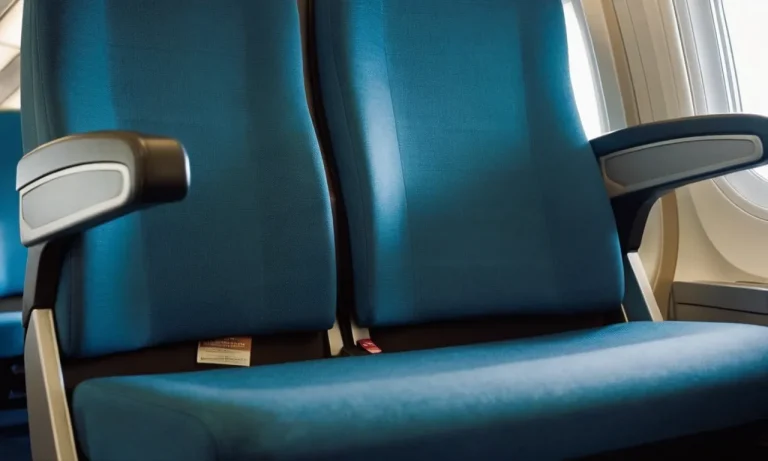
Can A 400 Pound Person Fit In An Airline Seat?
Being overweight can make air travel uncomfortable. If you weigh 400 pounds, will you be able to fit into a standard airline seat? Read on as we dive into the details. If you’re short on time, here’s a quick answer: Most 400 pound people cannot comfortably or safely fit into a standard airline seat. In…
Air Force One Tracker: Tracking The President’s Plane
Let’s talk about the Air Force One tracker. Have you ever looked up at a plane flying overhead and wondered if it was Air Force One? As the aircraft that transports the President of the United States, Air Force One generates significant interest regarding its flights. If you’re short on time, here’s a quick answer:…
Dubai (UAE) Rules And Laws You Must Know
Understanding Dubai (UAE) rules, laws and regulations is essential if you want to ensure a rewarding trouble-free, fun time in the city. Start here!
Find The Best Rates For Your Health Insurance Abroad
When you understand Dubai’s laws, rules, and regulations (United Arab Emirates) and appreciate the cultural differences, you can tap into an exceptional lifestyle in Dubai and avoid any issues with Dubai’s legal authorities.
Dubai is a Muslim state. It is strict in its moral and ethical code; it has some different laws to those in the UK, Europe, or America, and if you want to visit or live and work in the UAE you need to pay attention to those regulatory differnces.
Dubai Travel: Rules and Regulations for Expats and Tourists
We have produced a report that compiles the information you need to know and understand if you’re going to have a safe and enjoyable time living or on vacation in the UAE – from dress code to alcohol consumption and drug abuse to holding hands in public.
Regulations: Staying in Dubai
While Dubai is one of the most tolerant regions of the Middle East , the Emiratis are still very traditional and conservative people.
They take their culture and heritage seriously, and they expect visitors to respect their values. If you respect Emiratis, they will respect you, and you will find them warm and welcoming.
A to Z: UAE Rules, laws and Regulations
Alcohol consumption.
Non-Muslims are allowed to drink alcohol in Dubai if they are on licensed premises. Some restaurants and most hotels hold a license to serve you alcohol.
In 2020 the UAE introduced new legislation stating that drinking alcohol without a license is no longer illegal in the United Arab Emirates.
Bouncing Cheque (Not being able to pay)
In Dubai, it’s standard practice to pay for large ticket items, such as a car, or even your rent, with forward-dated cheques.
This is because it is very hard for expatriates to get credit or loans, and it’s the accepted method of staggering payments to offer up post-dated cheques.
However, unlike in other countries where bouncing a cheque will probably only generate a reminder letter or phone call, with UAE law, it is a serious criminal offense.
You could potentially be arrested, jailed, and then forced to remain in Dubai until your debt is paid and finally be deported from the country.
Please don’t write a forward-dated cheque unless you are sure you have the funds to cover it.
Dancing in Public
Dancing in public in Dubai is considered indecent . It is also considered provocative, which can be very risky for women.
You can dance freely in any nightclub, venue, or outside event where dancing is permitted.
Dress Code Rules
Visitors are expected to dress conservatively when in public places.
If you’re in a public place, shopping, or at work, you must ensure your clothes are reasonably conservative.
Don’t wear anything see-through or revealing that could be considered indecent. Take care not to wear T-shirts that have anything offensive on them, words, slogans, or images.
In shopping malls, you’ll see signs warning you that if you’re inappropriately dressed, you will be removed. Dress appropriately, and you won’t have any issues whatsoever.
When it comes to sunbathing, you can wear a bikini. However, you cannot sunbathe topless, nor is any form of nudity acceptable – including children.
Before you leave a beach, pool, or water park area, you have to be properly dressed for public places. Even if it’s only a few hundred meters, you can’t walk home in your bikini.
Drink Driving Laws (Zero Tolerance)
You cannot consume any alcohol whatsoever and get behind the wheel in Dubai. There is a zero-tolerance policy when it comes to drink-driving, and you will be imprisoned if you break this very firmly upheld law.
Driving Offenses
When you travel within the UAE, you might be forgiven for thinking that the traffic regulations are very lenient. However, that is not the case.
It is illegal to tailgate, break the speed limit, street race, lane hop, or use a mobile/cell phone while driving.
You will no doubt see many people using phones while driving. Remember, it isn’t legal; don’t risk spoiling your visit with a fine. Dubai has been cracking down on offenders more and more.
Drugs (Zero Tolerance)
As with drunk driving, Dubai laws have zero tolerance for drugs . Whilst you may think that only extends to narcotics that are illegal in our own countries, it actually extends to some prescription and over-the-counter medicines, even poppy seeds.
Even if you’re only traveling through an airport in the UAE on your way to visit another country if you’re caught with what’s deemed to be an illegal substance, you could face an automatic 4-year prison term before deportation.
If you’re thought to be supplying drugs, you could potentially face automatic life imprisonment.
Regarding drugs, the simplest and safest rule to follow is when visiting Dubai, bring absolutely nothing.
Prescription Drugs (Medication)
If you require prescription medicine, you need to check whether what you intend to import is on the banned substances list.
To make sure you won’t get in trouble when crossing the border, download this list of controlled drugs from the dha.gov.ae.
Here are the Drug Control Department’s details in the UAE Ministry of Health so that if you are ultimately left in any doubt, you can contact them before entering Dubai. The details are: Telephone: +971 2 611 7342 / +971 2 633 4958 Fax: +971 2 631 3742 e-mail: [email protected] Or write to: Ministry of Health Drug Control Department Abu Dhabi – UAE
Fundraising Activities (Prior Approval)
Any form of donations and fundraising within the UAE must be approved by the Islamic Affairs and Charitable Activities Department (IACAD) . If you fail to do so, however noble the cause, you will breach the UAE’s charity laws, which could result in imprisonment or a substantial fine.
Loud Music (Public and Residential Areas)
The use of loud music is prohibited in public areas, and dancing in public in non-authorized areas can also get you in further trouble.
You will also find there are often additional local laws that prohibit loud music in residential areas.
Offensive / Rude Behavior
Swearing or making any rude gestures isn’t tolerated and can result in a fine or even imprisonment.
Driving in Dubai can be erratic at times. Remember, road rage is not tolerated. If someone gives your car registration to the police and reports you for swearing or making any rude gestures, you could get a heavy fine.
Photographs (taken without consent)
Taking photos of anyone without their consent is a serious offense under UAE law and can land you in a lot of trouble very quickly.
If you’ve posted any of the images on social media, this will exacerbate the offense, and you will also be charged under cybercrime laws.
Take care in public places that you don’t accidentally photograph someone without their consent.
Possession of Drugs (and other illegal substances)
The penalties for the possession of drugs, even residual amounts, are severe. Including the death penalty if the authorities deemed you were doing something more substantial than personal use.
Also, in the UAE, any presence of drugs in your bloodstream will be regarded as possession of drugs.
Don’t take chances with any illegal substances, even if they are legal in your home country; so-called legal highs in many countries aren’t legal in Dubai.
Public displays of affection (kissing and hugging)
Holding hands in public if you’re a married couple is about as far as you can go regarding public displays of affection. Hugging, kissing, or smooching are not tolerated
Public Transport (Eating and Drinking)
Eating and drinking are prohibited on all forms of public transport. This also includes the stations outside of any official cafe or eatery.
On-the-spot fines can be issued if you’re caught eating.
Ramadan (Rules for Non-Muslims)
The month of Ramadan is the ninth month of the Islamic lunar calendar, during which Muslims fast during daylight hours to help purify the soul and refocus attention on God. Fasting goes beyond eating and drinking; it’s very much about exercising restraint during the holy month.
For non-Muslims in Dubai, it is illegal to eat, drink, or smoke in public during Ramadan, and this includes while in your car!
Some restaurants (normally within hotels) remain open, but you will eat somewhere out of sight.
Of course, you can eat and drink within the confines of your own home. It’s respectful to keep noise levels down during Ramadan, and you’ll notice that during daylight hours, Dubai seems a much quieter place.
Religious Respect and Tolerance
While the primary religion in Dubai is Islam – visitors can follow their own religions, which is tolerated.
However, anything that is an offense against Islam will not be tolerated on any level and will result in fines and/or imprisonment. There is no grey area.
Muslims are called to pray five times a day, and if you’re on the open road or in a public area away from a Mosque, Muslims will pray wherever they are. Please do not disturb them and respect their privacy.
Respect (Avoid Being Disrespectful)
In the UAE, you must be respectful of everyone around you – no matter what perceived cultural, religious, or even class differences there appear to be between you.
If you display improper, disrespectful conduct in public, you can fall foul of the law and face a fine, imprisonment, or even deportation.
While the above is the law, you will probably observe that in Dubai, certain nationalities of workers are treated less well than others.
However, if you’re rude to others, make offensive hand gestures if someone cuts you up in traffic, or issue an expletive if someone pushes in front of you in a queue, be prepared for the fallout.
Respect may not be universally observed in the UAE. However, if you want to live your life without conflict, you will observe respect unilaterally.
If you are in a confrontational situation, stay calm, bite your tongue, and be the grownup.
Sexual Harassment
Possibly a law that should be universal. Staring at women, following them, or taking photos without consent is sexual harassment, and you can be arrested, fined, or imprisoned.
In 2020, the government announced that men who subject women to harassment of any kind would face tougher punishment.
Sexual Relationships (Outside of Marriage)
Relationship laws and rules in Dubai are strict . Unless you are married, you cannot legally have sex.
In 2020, as a part of a significant overhaul of its Islamic personal laws, the Gulf state announced that living together outside marriage is no longer illegal in the United Arab Emirates.
However, it would be ill-advised to start any form of family planning outside of marriage while living in Dubai.
Shopping Malls (Rules To Follow)
Dress codes exist for visits to public places like shopping malls. Clothes should cover the tops of your arms and legs.
Don’t go to a shopping mall wearing beach or swimming clothes. Cross-dressing of any type shouldn’t even be considered.
Be respectful of Ramadan; it is forbidden to eat or drink during daylight hours. There are some exceptions, with restaurants having curtained-off areas for non-Muslims.
Smoking Rules
Smoking is banned in many public offices and shopping malls, so observe the rules.
There are designated smoking areas all over the city, so the ban is not difficult to observe, even for the heaviest smokers!
Social Media (Posting Rules)
Swearing is punishable by up to one year in prison, including your social media posts.
Any indecent language on WhatsApp or other messaging platforms can get you in a lot of trouble and any offensive posts on FaceBook or other social media networks.
This also includes the use of any emojis that contain indecent gestures. Any use of social media that invades another person’s privacy comes with a prison sentence of up to six months.
Users must refrain from insulting or offensive posts which defame Islam or any other religion . Under Article 35 of the UAE Cyber Crime Law, users could face imprisonment of up to seven years, followed by penalties that could range anywhere between AED250,000 to AED1 million.
Working in Dubai (legally)
You should not attempt to work without a permit in the UAE. You must obtain your paperwork before you take up your job – doing it any other way can land you in prison and deportation.
Dubai Rules & Laws – Summary
Most of the laws and rules in Dubai are common sense and familiar to people from most nations.
However, in certain cases – such as dress code and eating during the month of Ramadan the rules are unfamiliar, and care needs to be taken.
It’s not terribly hard to keep within the laws and rules of the UAE. Dubai is a tolerant city and has done much to make visitors from all nations feel welcome and enjoy a rewarding and fulfilling experience during their stay.
You might find useful:
- Living In Dubai – a detailed guide on moving to Dubai;
- Dubai Income Tax & Taxation Advantages For Expats ;
- Working In Dubai – How to Find A Good Job In The UAE .
- Best Neighborhoods In Dubai For Families
Helpful external links:
- Issue of permit to import medicines for personal use – the UAE Ministry of Health and Prevention site.
- An overview of the UAE’s recently updated laws – the official site of the UAE cabinet .
- Internet media regulations in Dubai – the UAE government site .
Expatra Research
Our most popular evergreen guides are kept fresh and up-to-date by our in-house research team. If you have any questions about our guides or the country discussed feel free to contact us or leave a comment below and we'll get back to you.
Leave the first comment (Cancel Reply)
- Environment
- Road to Net Zero
- Art & Design
- Film & TV
- Music & On-stage
- Pop Culture
- Fashion & Beauty
- Home & Garden
- Things to do
- Combat Sports
- Horse Racing
- Beyond the Headlines
- Trending Middle East
- Business Extra
- Culture Bites
- Year of Elections
- Pocketful of Dirhams
- Books of My Life
- Iraq: 20 Years On
Dubai travel restrictions: all you need to know about the Covid flying rules
Life in the emirate is back to normal as covid-19 rules have been relaxed in most places, offering tourists plenty of options to keep busy and entertained.
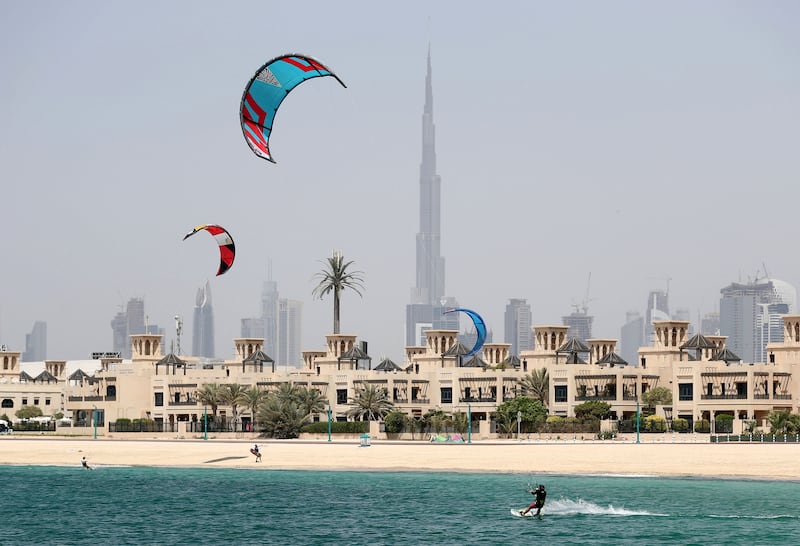
Dubai is set to see a busy winter tourism season with millions of tourists expected. Chris Whiteoak / The National

Follow the latest updates on the Covid-19 pandemic here
Expo 2020 Dubai is less than a month away.
And the emirate is ready to welcome the world , with millions of visitors expected to fly in from abroad.
Wintertime is also the peak tourist season marked by idyllic weather, which attracts people from all over the world. This year, it will also offer tourists a sense of freedom as many continue to face restrictions in their own countries.
Life in Dubai is back to normal as Covid-19 rules have been relaxed in most places, offering tourists plenty of options to keep busy and entertained.
But travelling in the time of Covid-19 is not as simple as it once was and safety precautions must be followed at all times in public places.
So what procedures do tourists have to follow and what can they do while on holiday?
The National explains.

About 80 per cent of the buildings will remain in some form. Many were constructed so that they could be transformed to residential units or commercial space
Do I need a visa?
It depends on your nationality. You can check whether you need a visa here .
Do I have to be vaccinated to visit Dubai?
No, travellers do not have to be vaccinated, but they must be tested for Covid-19 before travel, and in some cases on arrival.
What can I do during my stay in Dubai?
All public attractions are open to the public. Ain Dubai , the world's tallest observation wheel and the latest attraction in the emirate is set to open to the public on October 21, with tickets now available online.
Expo 2020 Dubai will be a major attraction and tickets to the event are now on sale worldwide. Precautions will be in place to protect visitors.
With more than 190 country pavilions, as well as themed exhibitions at the Opportunity, Mobility and Sustainability pavilions, 200 dining venues and up to 60 shows a day, tourists can add a few days to their itinerary to visit the expo site.
It will run from October 1, 2021 to March 31, 2022.
As of September 2, hotels can be at full occupancy (up from 70 per cent) while entertainment venues can increase capacity to 70 per cent (up from 50 per cent).
Restaurants and cafes can operate at 80 per cent capacity and can remain open until 3am.
The number of people who can sit at one table is 10 for restaurants and six at cafes.
Concerts, sports spectator events and social and institutional events are permitted providing the audience, participants and staff are inoculated against Covid-19 with an approved vaccine .
The maximum attendance for large public events that require permits is now 1,500 for indoors and 2,500 for outdoors.
Face masks are mandatory in public and in private gatherings and people are required to maintain a physical distance of two metres from others.
Have a look at Expo 2020's incredible Garden in the Sky
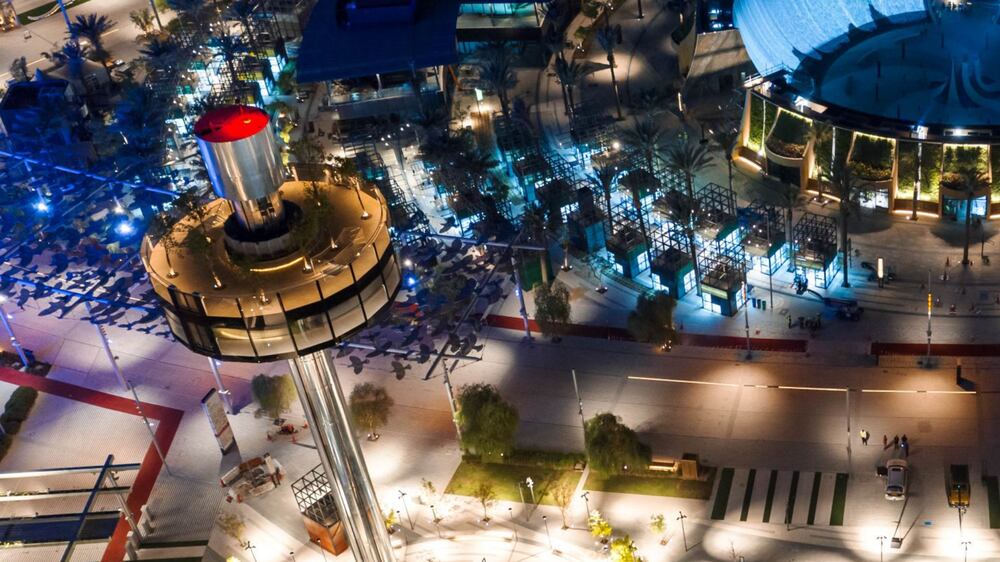
Do travellers need permission or register somewhere first to travel?
No. Tourists do not need approval from either Dubai's immigration authority, the General Directorate of Residency and Foreigners Affairs (GDRFA) or the Federal Authority for Identity and Citizenship (ICA) to travel to the emirate.
But passengers arriving from Bangladesh, Ethiopia, India, Nigeria, Pakistan, Sri Lanka, South Africa, Uganda, Vietnam and Zambia must follow specific rules. These include:
· Produce a negative PCR test certificate with a QR code issued within 48 hours prior to departure from an approved clinic, which can be found below using a link.
· Take a rapid PCR test, and be able to present the negative result in a QR code, from a test conducted at the departure airport within six hours of the flight.
Travel is not currently possible for those travelling directly from Bangladesh, Nigeria, Vietnam and Zambia to Dubai as there are no rapid PCR testing facilities at their airports.
Is a PCR test required for travellers from other countries too?
Yes, travellers arriving in Dubai from any destination must present a negative PCR result from a test taken no more than 72 hours before departure.
There are exemptions, which are set out below.
SMS certificates, antibody tests, NHS Covid Test certificates, plus results from rapid PCR tests and home-testing kits are not accepted. The test result must be official – either digital or printed – and written in English or Arabic, ready for presentation at check-in. Certificates in other languages are accepted if they can be validated at the point of departure.
Passengers travelling from Indonesia, Sudan, Lebanon, Egypt and Ethiopia must present a report linked with a QR code for verification purposes at check-in and on arrival in Dubai.
Where can I get tested before my flight to Dubai?
The UAE has approved a list of laboratories in every country, which can be found here .
I am travelling from India. Can I get a visa on arrival in Dubai?
Indian nationals who are travelling to or from India via Dubai can get a visa on arrival for 14 days if they have a visitor visa or a green card issued by the United States, or a residence visa issued by the United Kingdom or European Union. The visas must be valid for a minimum of six months. Anyone who does not have that can apply for a visit visa for the UAE .
Will I need to take a second test on arrival?
Perhaps. Some passengers must take a second test on arrival in Dubai.
The rule applies if the passengers are travelling from: Afghanistan, Angola, Argentina, Azerbaijan, Bahrain, Bangladesh, Bosnia & Herzegovina, Brazil, Cambodia, Chile, Croatia, Cyprus, Djibouti, Egypt, Eritrea, Ethiopia, Georgia, Ghana, Greece, Guinea, Hungary, India, Indonesia, Iran, Iraq, Israel, Ivory Coast, Jordan, Kenya, Kuwait, Kyrgyzstan, Lebanon, Malta, Moldova, Montenegro, Morocco, Myanmar, Nepal, Pakistan, Poland, Philippines, Qatar, Rwanda, Russia, Senegal, Slovakia, Somaliland, Somalia, South Africa, South Sudan, Sudan, Syria, Tajikistan, Tanzania, Thailand, Tunisia, Turkey, Turkmenistan, Uganda, Ukraine, Uzbekistan, Zimbabwe.
Do travellers have to quarantine in Dubai?
No. There is no quarantine on arrival in Dubai.
But anyone who takes a Covid test at the airport must remain in their hotel or residence until they receive the result. If it is positive, the traveller will have to isolate as per Dubai Health Authority guidelines. If it is negative, they are free to go out and explore the city.
Is anyone exempt from taking a PCR test, if it is required?
Children under the age of 12 and passengers who have a moderate or severe disability – including acute spinal cord injury, Alzheimer's disease, amyotrophic lateral sclerosis, ataxia, autism spectrum, Bell's palsy, brain tumours, cerebral aneurysm, cerebral palsy, Down syndrome, epilepsy and seizures – are exempt from taking a PCR test.
But all other passengers, including those who are visually, physically or hearing impaired, must take a test if required.
A first look at Ain Dubai - in pictures
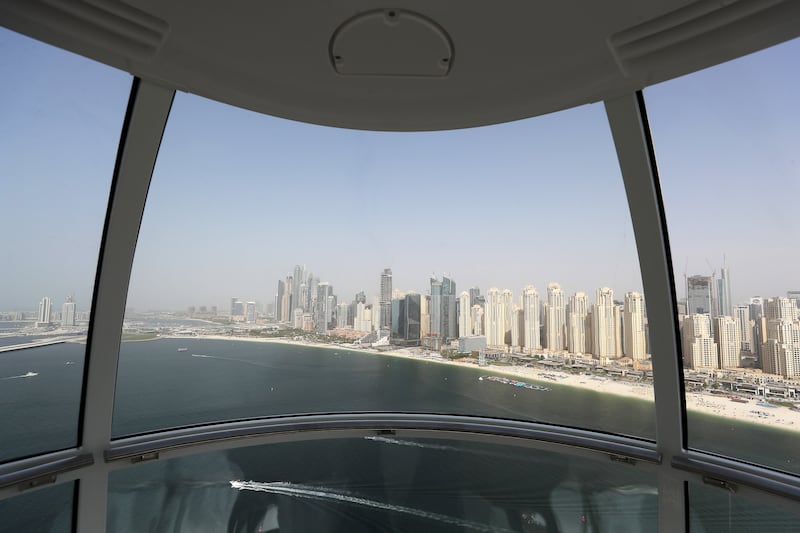
Ain Dubai will open to the public on October 21. Pawan Singh / The National
The UAE Today
The latest news and analysis from the Emirates

Welcome to a sun-soaked metropolis like no other
Plan your dream wedding in an unforgettable destination
Discover the city's insiders, influencers and innovators
Every district in Dubai tells its own unique story
Admire the city's traditional arts, crafts and cultural gems
Get more out of your holiday with these guides
Escape to the hills and explore nature
Answer the call of the wild and experience desert thrills

Uncover the city’s rich heritage and vibrant arts scene
Embark on thrilling new adventures for all ages
Taste award-winning world flavours and local cuisine
Visit the latest hotspots, openings and attractions
Find new surprises at modern malls and traditional souks
Marvel at record-breaking venues and iconic landmarks
Unwind at Dubai's luxury spas and wellbeing havens
What do you travel for? Find inspiration with our itineraries

Book a table at these fresh hotspots
Taste a deliciously different side of Dubai
Discover our homegrown culinary heroes
See all the restaurants unveiled in the Dubai selection
Weekends in Dubai are for feasting
Explore Dubai's plant-based concepts that impress
Reserve a table at top restaurants for incredible prices
Browse through our listing of restaurants

Don't miss a beat – live concerts, festivals, activities and more
Follow the flavours to the city's most-awaited feast, featuring your foodie favourites
Keep your controllers ready for the ultimate gaming festival

Plan ahead for a hassle-free travel experience
From etiquette to currency, we answer all your questions
Use our tool to book flight tickets to Dubai and plan your trip to the city
Dubai has an incredible range of stay options for every budget
From take-off to touchdown, navigating Dubai is a breeze
Your complete guide to enjoying one of the world's safest cities to the fullest
Find out all about Dubai’s climate throughout the year with our weather guide
All you need to know about the dirham, from exchange rates to helpful tips
Helpful information for travellers with special needs
Unlock huge savings with pre-paid access to top spots
Get our apps for the latest attractions, events & itineraries

Save big with great offers on Dubai's top sights and activities
Indulge in retail therapy for less with big discounts
Enjoy a trip to Dubai with incredible accommodation offers
Sign up for kid-friendly activities or attend a live show with the entire family
Get tickets to the best concerts featuring A-list artists at world-class venues
Join Dubai's community sporting activities and race to the finish line
See the maestro perform his hits live at the Coca-Cola Arena
Make way for the region's largest affordable retail art fair
Related Sites
Add items to your Top Picks by clicking the heart icon as you navigate through the website
This is now in your Top Picks!
Login or create an account to save your favourites and receive personalised recommendations.
Login to like
Sign in or register to like this content
- Visit Dubai
Frequently asked questions
Explore frequently asked questions about visiting Dubai, including guidelines around the current Covid-19 rules and precautions.
About Dubai
What are people from Dubai called?
What can you do in Dubai?
What is Dubai famous for?
What language do they speak in Dubai?
What was the original name of Dubai?
Why do people love Dubai?
Why do people move to Dubai?
Geography and History
Is Dubai a city or a country?
What are the historical origins of Dubai?
What is the difference between Dubai and the United Arab Emirates?
Where is Dubai and in which country is it located?
Cost of Living and Expenses
What can you buy for AED 1 in Dubai?
Is Dubai cheap or expensive?
Is gold cheaper in Dubai than elsewhere in the world?
What is the cost of living in Dubai?
What salary do I need to live well in Dubai?
Life in Dubai
Are public displays of affection allowed in Dubai?
Can I drink alcohol in Dubai?
Can I wear shorts in Dubai?
Do women in Dubai have to wear a headscarf?
Can I swim in the sea in Dubai?
Can I tan in Dubai?
Can I live in Dubai?
Do people pay tax in Dubai?
Is Dubai dog-friendly?
What can women wear in Dubai?
What is the sea like in Dubai?
Where are the public beaches in Dubai?
Are women in Dubai restricted in any way?
Is there anything prohibited in Dubai?
Ramadan in Dubai
What are the rules during Ramadan?
Are restaurants closed in Dubai during Ramadan?
Can I visit Dubai during Ramadan?
Do people give gifts during Ramadan?
How is Ramadan observed in Dubai?
Is Ramadan a good time to visit Dubai?
What are traditions of Ramadan In Dubai?
What do you do on the first day of Ramadan?
What food is eaten during Ramadan?
What is Ramadan and when is it celebrated?
Why do Muslims fast during Ramadan?
Why do the dates of Ramadan change every year?
What should you wear during Ramadan?
Do hotels operate normally during Ramadan?
What are the rules for eating, drinking and smoking during Ramadan fasting hours?
Can you go to the beach and dine at restaurants during Ramadan?
Travel and Budget
What do I need to bring when visiting Dubai?
How can I spend a week in Dubai?
Can I pay with euros in Dubai?
How much do I need to spend for a honeymoon in Dubai?
How much does a taxi cost in Dubai?
Is Dubai expensive as a holiday destination
What is the cheapest month to visit Dubai?
What should my budget be for a week's holiday in Dubai?
Where can I take the metro in Dubai?
What is the official language in Dubai?
How do you say "hello" in Dubai?
What languages are spoken in Dubai?
Does Dubai get cold at night?
Does Dubai have four seasons?
Does it snow in Dubai?
What is a good climate for a visit to Dubai?
What is the coldest month in Dubai?
What type of climate does Dubai have?
When is it cold in Dubai?
Safety in Dubai
How safe is Dubai for women?
Is anything prohibited in Dubai?
Is Dubai a safe holiday destination?
Is it safe to walk around at night in Dubai?
What items are not allowed in Dubai Airports?
Visit Dubai App
What can I use the app for?
Do I need to go online to use the app?
Do you have both Android and iOS versions of the app?
I cannot remember my login details. What should I do?
What do I do if a place in the app is now closed or the information is wrong?
What happens to my personal data?
Which languages is the app available in?
DXB Adventure
- Overnight Desert Safari
- Dhow Cruise Musandam
- Hatta Mountain Tour
- Quad Bike Safari

Weapons and Related Equipment
Possession of weapons and related equipment, including firearms and ammunition, is tightly regulated in Dubai. Unauthorized possession can lead to severe legal penalties.
Technical Equipment
Some technical equipment, including drones and specific radio frequencies, may require permits for use in Dubai. Ensure compliance with local regulations when using such equipment.
Essential Rules for First-Time Visitors to Dubai
First-time visitors should be aware of local customs, dress codes, and behavior expectations. Familiarize yourself with the city’s rules and regulations to ensure a respectful and trouble-free experience.
Reserve Your Tickets for Burj Khalifa: If you plan to visit the Burj Khalifa, the world’s tallest building, it’s advisable to reserve tickets in advance to avoid long wait times.
No Casino in Dubai: Dubai does not have legal casinos. Gambling is generally prohibited in the UAE, with a few exceptions in certain free zones.
Shopping is Expensive: While Dubai offers a wide range of shopping experiences, it’s important to note that some items can be expensive. Be prepared for luxury shopping and budget accordingly.
Sunday is a Working Day: Unlike some Western countries, Sunday is a working day in Dubai. The official weekend typically falls on Friday and Saturday.
Dubai Travel Advisories: Stay informed about travel advisories and safety recommendations issued by your home country’s embassy or consulate in Dubai. This information can be valuable in case of emergencies or unforeseen situations.
Taking Medicine Abroad: If you need to bring medication to Dubai, ensure it’s in its original packaging and accompanied by a prescription or a doctor’s note. Certain medications, especially those containing controlled substances, may require special permits.
Banned Items in Dubai: Dubai has stringent regulations on prohibited items, including narcotics, certain medications, e-cigarettes, and vaping products. Familiarize yourself with the list of prohibited items to avoid legal issues.
Showing Respect to Dubai’s Royals: The UAE has a royal family, and it’s essential to show respect and deference to the ruling family and their images or symbols. Avoid any disrespectful gestures or comments about the royal family.
Must-See Places in Dubai: Dubai boasts iconic attractions such as the Burj Khalifa, Burj Al Arab, Dubai Mall, and Palm Jumeirah. Ensure you visit these landmarks to experience the city’s grandeur.
Dressing Right in Dubai: Dress modestly in public areas to respect local customs. Cover your shoulders, cleavage, and knees, especially when visiting religious sites. Beachwear is acceptable only at beaches and pools.
Good Behavior in Public in Dubai: Maintain good behavior in public spaces by refraining from public displays of affection, swearing, and indecent behavior. Abide by Dubai’s regulations to ensure a harmonious environment.
Taking Photos in Dubai: Seek permission before taking photos of people, especially locals. Avoid photographing sensitive areas like government buildings and military installations. Always follow guidelines for responsible photography.
Driving and Traffic Rules
Rules for renting and driving vehicles.
- To rent and drive a vehicle in Dubai, you typically need a valid international driver’s license or a driving license from one of the approved countries. Ensure you have the necessary documentation before renting a vehicle.
- Seat belts are mandatory for all passengers, and child car seats are required for young children.
- Avoid using a mobile phone while driving unless you have a hands-free device.
Speed Limits and Traffic Regulations
- Dubai enforces strict speed limits well-marked on the roads. Exceeding the speed limit can result in hefty fines and even license suspension for severe violations.
- The blood alcohol limit for drivers in Dubai is very low, and driving under the influence of alcohol can lead to severe penalties, including imprisonment and fines.
- Follow traffic signals and signs diligently. Running red lights and not stopping at stop signs can lead to fines and other consequences.
Parking Regulations in Dubai
- Paid parking is common in commercial areas, and you should ensure you’ve paid for parking and displayed a valid parking ticket.
- Avoid parking in designated no-parking zones, disabled parking spaces, or in front of fire hydrants. Violations can result in fines and vehicle impoundment.
- Be aware of paid parking timings, as some areas may offer free parking during certain hours.
Currency Exchange and Banking in Dubai
Dubai’s well-established banking and financial sector offers numerous exchange houses and banks where you can exchange your currency for UAE Dirhams (AED). Currency exchange services are available at airports, malls, and major commercial areas.
Dubai provides various banking services , including ATMs, online banking, and mobile banking apps. International credit and debit cards are widely accepted at most establishments.
Exchange rates can vary between providers, so it’s wise to compare rates and fees before exchanging currency. Banks usually offer competitive rates, but exchange houses may have slightly better rates.
Financial Transactions and Currency Restrictions
For significant financial transactions or investments, consult a financial advisor or a representative from a reputable bank. Dubai has strict regulations for financial activities, especially for expatriates.
While there are no restrictions on bringing foreign currency into Dubai, there are limits on the amount of local currency (AED) you can bring in or take out of the country. It’s essential to declare amounts exceeding these limits at customs.
Dubai has stringent laws against financial crimes , including money laundering and fraud. Conduct financial transactions through reputable and licensed institutions to avoid legal consequences.
Public Transportation Etiquette
Using the dubai metro and public buses.
- Queue politely when waiting for the Dubai Metro or public buses, allowing passengers to exit before entering.
- Priority seating is reserved for the elderly, pregnant women, and people with disabilities. It’s courteous to vacate these seats for those who need them.
- Maintain a quiet and respectful demeanor while using public transportation. Loud conversations and playing music without headphones may disturb others.
- Eating and drinking are generally not allowed on public transportation in Dubai . Respect this rule to keep the vehicles clean.
- Ensure you have a valid ticket or card for the Dubai Metro or buses. Always tap in and tap out when using transportation cards to pay for your journey.
Navigating Taxis and Ride-Sharing Services
- Use designated taxi stands or ranks when looking for a taxi, and avoid hailing taxis from unauthorized locations.
- If using ride-sharing services like Uber or Lyft, ensure you use the official apps and verify the vehicle details and driver’s identity before getting in.
- While engaging in conversation with taxi or ride-sharing drivers is common, respect their privacy and avoid intrusive questions.
- Tipping taxi drivers is appreciated but optional. It’s customary to round up the fare or leave a small tip.
- Ensure you and your passengers fasten seatbelts when using taxis or ride-sharing services.
Health and Medical Considerations
Healthcare services for tourists.
It’s highly advisable to have comprehensive travel insurance that covers medical emergencies when visiting Dubai. Check that your insurance includes medical expenses, hospitalization, and emergency evacuation coverage.
Dubai offers world-class healthcare services with modern facilities and well-trained medical professionals. Hospitals in Dubai are equipped to handle a wide range of medical issues.
Dubai has become a hub for medical tourism, with specialized medical centers and hospitals offering services ranging from cosmetic surgery to advanced medical treatments .
Pharmacies in Dubai are well-stocked and easily accessible. You can purchase over-the-counter medications for common ailments, but for prescription medications , you will need a doctor’s prescription.
Emergency Services and Medical Facilities
In case of a medical emergency, dial 999 for immediate assistance.
Dubai has a highly responsive emergency services system, and operators are typically fluent in English and Arabic.
It has a network of public and private hospitals and clinics. Some notable hospitals include Dubai Hospital, Rashid Hospital, and American Hospital Dubai. These facilities offer emergency services , specialized care, and multilingual staff.
Throughout Dubai, you’ll find pharmacies and clinics, including 24-hour pharmacies . They can provide primary medical advice and treatment for minor ailments.
Be aware of stringent COVID-19 safety measures , which may include testing and quarantine requirements. Stay updated on the latest COVID-19 guidelines and needs before and during your visit.
Safety and Security
General safety tips for tourists.
- Stay informed about local laws, customs, and current events in Dubai. Awareness can help you avoid unintentional violations and stay secure in Dubai .
- Respect strict local laws with violations resulting in fines or legal consequences.
- Follow the rules and regulations related to alcohol, public behavior, and dress codes.
- Keep an eye on your belongings , especially in crowded areas and public transportation. Avoid displaying valuable items like expensive jewelry or electronics.
- Keep your passport, identification, and travel documents secure . Make copies of important documents and store them separately from the originals.
- Know the emergency contact numbers in Dubai, such as 999 for police, 998 for fire, and 997 for ambulance services .
- Be mindful of local customs and cultural norms , especially during religious events and in sensitive areas. Dress modestly in public places.
- Dubai’s climate can be very hot and sunny. Use sunscreen, wear sunglasses, and stay hydrated to protect yourself from the sun.
Emergency Contact Information
Emergency Services: In case of an emergency, dial 999 for immediate assistance . This number is used for police, fire, and medical emergencies.
Police: For non-emergency situations or to report a crime, contact the Dubai Police on 901.
Medical Emergencies: For medical emergencies, including ambulance services, dial 997.
Fire Emergencies: In case of a fire or other related emergencies, dial 998 to reach the Dubai Civil Defense.
Know the contact information for your country’s embassy or consulate in Dubai. They can assist in case of emergencies or if you lose your passport.
Dubai also has a tourist helpline that you can contact for general inquiries and assistance. The Dubai Tourism Contact Center can be reached at +971 600 555559 .
Shopping and Souvenirs
Tips for shopping in dubai’s markets and malls.
- Bargaining is common in Dubai’s traditional markets (souks), such as the Gold Souk and Spice Souk . Polite negotiation can sometimes lower prices, especially when buying from independent sellers.
- Dubai has several prominent shopping festivals and sales events throughout the year, offering discounts and promotions. The Dubai Shopping Festival (DSF) is one of the most significant events, usually held in January and February.
- Tourists in Dubai can take advantage of the Value Added Tax (VAT) refund scheme. When making purchases, ask the retailer about the process for VAT refunds and ensure you meet the eligibility criteria.
- Dubai is known for its competitive prices on electronics and gold . When shopping for such items, compare prices and authenticity guarantees from different retailers.
- Dubai International Airport offers an extensive selection of duty-free shops with various products, including luxury items, electronics, and perfumes. Be aware of customs limits when making duty-free purchases.
Exporting Souvenirs and Goods
- When leaving Dubai, you may need to declare certain items, precious souvenirs, and gifts. Familiarize yourself with your home country’s customs regulations to ensure compliance.
- If you have made eligible purchases and obtained VAT refund receipts, follow the VAT refund process at the airport before departure. Keep your purchases and receipts readily accessible for customs inspection.
- Be aware of items that may be prohibited for export from Dubai. Certain cultural artifacts, antiques, and wildlife products may require special permits or be restricted.
- Keep all purchase receipts, certificates, and documentation for valuable items, especially if they are subject to customs regulations or restrictions in your home country.
- When bringing back gifts or souvenirs, consider the customs regulations of your home country. Some items like food products and plant materials may be subject to import restrictions.
Communication and Internet
Mobile networks and sim cards for tourists.
- Tourists can easily obtain prepaid SIM cards in Dubai at the airport, local shops, and mobile service provider stores. Ensure your smartphone is unlocked to use a local SIM card.
- Major mobile service providers in Dubai include Etisalat and Du. You can choose a provider and a prepaid plan that suits your data and calling needs.
- You may be asked to provide identification, such as your passport, when purchasing a SIM card. This is a standard requirement for registration.
- Dubai offers a variety of data packages for tourists, including short-term options that can be activated for a specified number of days, often with high-speed data.
Access to Wi-Fi and Internet Services
- Most hotels and accommodations in Dubai offer complimentary Wi-Fi for guests, but the quality and speed may vary, so check with your accommodation regarding internet access.
- Dubai provides free public Wi-Fi in many public areas, including parks, beaches, and government buildings. Look for “Dubai WiFi” networks and follow the instructions to connect.
- Internet cafes are available in Dubai, offering access to computers and the internet for a fee. These cafes can be useful if you don’t have a mobile data plan or need to print documents.
- If you prefer to use your home country’s mobile data plan while in Dubai, check with your mobile service provider about international roaming rates and options.
- Be aware that some internet services and websites may be subject to restrictions in Dubai. To access certain content, you may need to use a Virtual Private Network (VPN), but be sure to use a legal and authorized VPN service.
Local Cuisine and Dining Etiquette
Exploring dubai’s food scene.
Dubai’s culinary scene is a vibrant tapestry of flavors from around the globe.
Diverse Cuisine: Dubai is a culinary melting pot, offering a wide range of cuisines from around the world. You can savor traditional Emirati dishes, Middle Eastern delights, Asian flavors, and international cuisine at various restaurants and street food stalls.
Street Food: To truly immerse yourself in the local food culture , exploring Dubai’s street food scene is a must. Be sure to sample mouthwatering shawarmas, crispy falafels, and unique local specialties like camel meat dishes and Arabic sweets.
Fine Dining: Dubai is renowned for its luxurious dining options, including Michelin-starred restaurants. If you plan to indulge in fine dining experiences, it’s advisable to make reservations in advance to secure your spot at these upscale establishments.
Alcohol Regulations: While many restaurants in Dubai serve alcohol, remember that it’s available only in licensed venues. Please respect the rules and guidelines pertaining to alcohol consumption while dining out.
Dining Etiquette and Tipping Practices
Enjoying meals in Dubai comes with its own set of etiquettes and practices that ensure a pleasant dining experience.
Table Manners: When dining in Dubai, you’ll typically use utensils and follow typical Western table manners. However, in some Middle Eastern and Emirati restaurants, especially when indulging in dishes like kebabs or biryani, it’s common to eat with your right hand.
Dress Code: Modesty is key when dining in public restaurants. Respect the dress code of the establishment, especially in more traditional venues. Beachwear is perfectly acceptable at beachfront restaurants.
Tipping: While tipping is appreciated in Dubai, it’s not obligatory. A customary tip ranges from 10-15% of restaurant bills. Some upscale venues may include a service charge in the bill, so checking before leaving an additional tip is a good practice.
Water and Beverages: You can safely enjoy tap water in Dubai, as it’s served at most restaurants. However, bottled water is also widely available. Alcoholic beverages are primarily served in licensed venues, such as hotels and clubs.
Reservations: Making reservations in advance is highly advisable to ensure a smooth dining experience, especially at popular restaurants or during peak hours.
Ramadan Dining: During the holy month of Ramadan, many restaurants remain open, but their operating hours may vary. Refraining from eating, drinking, or smoking in public areas during fasting hours is respectful. For delightful Iftar options, check with restaurants offering special menus.
Environmental Awareness
Environmental conservation efforts in dubai.
Dubai is a hub of modernity and a center of environmental conservation efforts.
Sustainable Initiatives: The city has taken significant strides towards ecological conservation with initiatives to reduce carbon emissions, improve air quality, and enhance sustainability. Some notable programs include the Dubai Clean Energy Strategy and the Dubai Green Mobility Initiative.
Renewable Energy: Dubai’s commitment to sustainability is further exemplified by substantial investments in renewable energy sources, particularly solar power. The Mohammed bin Rashid Al Maktoum Solar Park, one of the world’s largest solar energy projects, is a testament to these efforts.
Waste Management: Dubai has implemented advanced waste management systems to reduce landfill waste and promote recycling. Public awareness campaigns encourage residents and visitors to recycle and responsibly dispose of waste.
Water Conservation: Given its arid climate, water conservation is a top priority in Dubai. Innovative technologies like drip irrigation and smart meters optimize water usage in landscaping and construction.
Responsible Tourism and Sustainability
As a responsible tourist, there are several actions you can take to support and promote sustainability in Dubai.
Respect the Environment: When exploring natural attractions in Dubai, such as deserts and beaches, adhere to the “leave no trace” principle. Avoid littering, stay on designated paths, and respect local wildlife.
Choose Eco-Friendly Activities: Seek out eco-friendly tour operators and activities that champion responsible tourism practices. For instance, consider opting for desert safaris with low-impact practices.
Water Conservation: Be conscious of water usage, particularly in hotels. Reusing towels and using water sparingly can contribute to ongoing water conservation efforts.
Reduce Plastic Waste: Play your part in minimizing single-use plastics. Carry a reusable water bottle and shopping bag, and decline plastic straws when dining out.
Support Sustainable Businesses: Look for hotels, restaurants, and businesses that have adopted sustainable practices and are dedicated to reducing their environmental footprint.
Public Transportation: Consider utilizing public transportation options like the Dubai Metro to reduce carbon emissions from personal vehicles and contribute to a greener environment.
Understanding Tourist Rights and Legal Assistance
Being aware of your rights and knowing how to seek legal assistance is vital during your visit to Dubai.
Tourist Rights: Tourists in Dubai are afforded protection under local laws and regulations. Take time to familiarize yourself with your rights and responsibilities as a tourist, and adhere to local laws and customs.
Legal Assistance: If you encounter legal issues, it’s advisable to seek legal advice from a qualified attorney or legal consultant familiar with Dubai’s legal system. They can guide you through the legal process and help safeguard your rights.
Consular Assistance: If you are arrested or detained in Dubai, contact your embassy or consulate immediately. Consular officers can provide information about the local legal process, arrange legal representation if necessary, and offer support throughout legal proceedings.
Language Barrier: In legal matters, language can be a significant barrier. Suppose you do not speak Arabic and are involved in a legal situation. In that case, it’s crucial to have a translator or interpreter present to ensure you understand the proceedings and can communicate effectively with legal authorities.
Dubai is a city that seamlessly blends tradition and innovation, offering an unforgettable experience for every traveler. As you navigate its bustling markets, savor local and international cuisines, and embrace sustainability, remember that respect for local customs and the environment will enhance your journey.
By adhering to cultural etiquette, indulging in Dubai’s culinary wonders, and embracing eco-friendly practices, you not only contribute to a harmonious travel experience but also leave a positive impact on this incredible destination.
Dubai welcomes you with open arms, eager to share its heritage and beauty, so go ahead and explore, indulge, and leave a lasting impression as you take home memories of this extraordinary city.
What Are the 10 Rules in Dubai?
- Dress conservatively
- Limited public affection
- Ramadan awareness (No eating/drinking in public during daylight hours)
- Alcohol responsibly (Only in licensed venues). Avoid intoxication.
- Ask before taking photos of people. Avoid sensitive locations.
- Zero tolerance for drugs
- Respect local customs & traditions
- Traffic laws are followed strictly (Heavy fines for speeding, DUI, etc).
- Mind noise & littering is considered offensive.
- Sunday is a working day.
Is Dubai Strict on Tourists?
Dubai welcomes tourists and is one of the safest cities for tourists. However, it expects respect for local laws and customs. Ignorance isn’t an excuse, so familiarize yourself with the rules before you visit Dubai.
What is the New Rule in UAE 2024?
UAE New Visa Extension Rules in 2024: According to the amendments, visitors holding 30- and 60-day visit visas can extend their stay for an extra 30 days from within the country. However, note that one can not stay in the country for more than 120 days.
Why Can't You Use Your Left Hand in Dubai?
The Left-Hand Taboo is Not True! In UAE’s culture, the right hand is preferred for eating and greetings. But, using the left isn’t illegal or offensive.
Can I Hold My Child's Hand in Dubai?
Yes, you can hold a child’s hand in Dubai, However, In UAE public displays of affection, including holding hands, are generally discouraged in public places, especially between unmarried couples while the rules may be more relaxed within families.
What is the Fine for Tourist in Dubai?
The UAE ICP has implemented a standardized penalty for overstaying effective October 14, 2022. According to the updated regulations, individuals exceeding the allowed duration on a visitor, tourist, or resident visa will incur a daily fee of AED 50.
Why is Crime So Low in Dubai?
Dubai’s low crime rate stems from a combination of factors:
- Strict Laws and enforcement
- Strong Culture of Respect
- High Economic Opportunity
- Focus on Technology (Surveillance & data analysis)
- Tourist-Friendly Policies.
Is Swearing Illegal in UAE?
Swearing in public is strictly forbidden in the UAE, and using offensive language is considered a criminal offence that violates the modesty or honor of an individual, as stated in Article 373 of the UAE Penal Code . Violating this prohibition can lead to imprisonment for up to one year and a substantial fine of up to 10,000 dirhams.
When Not to Go to Dubai?
Unlike most places in the world, June to August are the worst months to visit Dubai. During summers, the temperatures are almost unbearably hot, with highs reaching over 105 degrees Fahrenheit and lows only around 90 degrees.
Can You Not Take Pictures in Dubai?
In Dubai and all around the UAE, you are not allowed to take anyone’s picture without consent. If you violate someone’s privacy, there is a high chance that you may face serious consequences.
What is the New Law for Pregnancy in UAE?
While no major pregnancy-specific laws have passed in the UAE this year, recent changes like extended maternity leave, legalized cohabitation, and anti-discrimination measures have impacted pregnant women. Be aware of premarital screenings, varying medical costs, and cultural influences, and consult professionals for specific legal and medical advice to navigate your pregnancy smoothly in the UAE.
What Are the Rules in Dubai for Women?
- Bikinis are allowed only at beaches.
- Avoid public displays of affection.
- Refrain from drinking alcohol in public.
- Cover your head when entering religious places.
Can a Brother and Sister Share a Hotel Room in Dubai?
Indeed, a family can stay together in a hotel room in Dubai. As per the U.A.E. Federal Law Number 9 of 1975, hotels can host any number of individuals in a room, provided all occupants share the same nationality. Typically, each extra person must be at least 10 years old.
What is 600 Fine in Dubai?
The 600 AED traffic fine is for exceeding the speed limit by less than 30 km/h over the allowed speed restriction.
What is a 500,000 Fine in UAE?
Under the UAE’s cyber crime laws, a penalty of 500,000 dirhams, deportation, and imprisonment is applicable for releasing photos in the Emirates to cause harm, whether in private or public locations, as declared by the UAE authorities.
What is the 400 AED fine in Dubai?
Parking on pavements: A penalty of AED 400 is for parking your vehicle in a way that harms pedestrians or blocks pedestrian movement with your vehicle.

- Other languages
- Accessibility

- Information and services
- About the UAE
- Visa and Emirates ID
- Visit visas
Tourist visa
A tourist visa is for those who are not eligible for visa on arrival or a visa-free entry to the UAE. You can apply for a tourist visa through airlines, hotels and travel agents. Read about the eligibility criteria and the steps to apply.
Multiple entry 5-year tourist visa
Who is a tourist visa for, who can apply for your tourist visa, related eservices.
The multiple entry 5-year tourist visa enables tourists to enter the UAE multiple times on self-sponsorship and remain in the country for 90 days on each visit, and can be extended for further 90 days. This type of tourist visa can be issued for all nationalities.
To obtain this visa, the applicant must have:
- a bank balance of 4,000 USD or its equivalent in foreign currencies during the last six months
- a valid health insurance policy applicable in the UAE
- a ticket to and from the UAE
Documents required
To apply for the multiple entry tourist visa, the applicant must provide the following:
- a colored photo
- a copy of the passport
- medical Insurance
- bank statement for the last 6 months with a balance 4,000 USD or its equivalent in foreign currencies
- tour programme
- a ticket for onward journey.
Read related news coverage on WAM .
Related online services
- Issue family group multiple entry long-term tourist visa - 5 years - (all nationalities) – ICP
- Issue multiple entries long-term tourist visa - 5 years - (all nationalities) – ICP
Tourist visa is for those who are not eligible for visa on arrival or a visa-free entry to the UAE. Tourist visa can be obtained for eligible individual tourists from around the world. Females below the age of 18 are not eligible to apply for this type of visa unless they are travelling with their parents.
According to a Cabinet resolution passed in July 2018, children under the age of 18 years who are accompanying adults, can get a free visa for their visit from 15 July to 15 September each year.
Tourist visas through airlines
Each airline has some conditions, which must be met in order for your visa to be arranged by them. One of the conditions is flying with them. For more updated and specific information, check the following UAE-based airlines for visa types, facilities, terms and conditions:
- Visa services from Etihad Airways - Etihad Airways
- Visa Services offered by Emirates Airline - Emirates Airline
- Visa services from Fly Dubai - Fly Dubai
- Visa services from Air Arabia - Air Arabia
Tourist visas through agencies and hotels
Licensed travel agents and hotels in the UAE can arrange a tourist visa for you provided you purchase the ticket through them and maintain hotel reservation with the specific hotel.
You can also contact travel agencies in your country for any tourist packages available to the UAE in collaboration with a local tour operator.
It is important to check the authenticity of travel agents you are dealing with and refrain from paying or sending copies of your official documents until after you are 100 per cent sure the tour operator is genuine. You can seek the help of the UAE embassy in your country for verification.
Note: The UAE embassies do not issue tourist visas. In order to get a tourist visa to the UAE, you need to get in touch with one of the UAE-based airlines, a tour agency or a hotel (where you intend to stay) in the UAE who will apply for visa on your behalf to the official visa-issuing authorities in the UAE.
- Tourist visa from Etihad Airways - Etihad Airways
- Tourist visa from Emirates Airline - Emirates Airline
- Tourist visa from Fly Dubai - Fly Dubai
- Tourist visa from Air Arabia - Air Arabia
Was this information helpful?
Give us your feedback so we can improve your experience.
Thank you for submitting your feedback.
Popular searches
- Government services around the clock
- Moving to the UAE
- العربية Other languages
- Area Guides
- Building Guides
- School Guides
- Floor plans
- Market Trends
- Life at Bayut

Tourists in Dubai – Your Do’s and Don’ts For Visiting Dubai
Planning a visit to the most exciting place in the Middle East? You must be thinking of all the fun and adventurous things you can do on your visit to Dubai, but today we’re here to tell you all about the things that may not be going through your mind while visiting Dubai.
One of the things to remember while visiting Dubai is that the UAE’s most thrilling city has certain cultural and religious values and rules. While this will definitely not diminish your plans of having one of the best vacations of your life, you must make note of these dos and don’ts as a tourist in Dubai.

Do’s For Tourists in Dubai
You can practically do anything when visiting Dubai, almost anything. The city is overflowing with an abundance of activities that are meant for all. Whether you’re an adventure seeker, or a history buff, an art admirer, or a nature lover, there’s a lot of things everyone can enjoy and make wonderful memories with, when visiting Dubai.
As a tourist or a potential expat in Dubai, you will get lots of advice and suggestions on what are the must-do activities and the must-visit places, but what people may miss out on explaining are all the cultural norms and behavioural implications. MyBayut is here to cover most of them today so you can enjoy your time in the city to its fullest!
Dress to impress but make sure it’s modest!
Everyone knows the popular adage ‘When in Rome, do as the Romans do.’ When you are in the UAE it is important to be culturally sensitive to Emirati etiquette and dress appropriately. This certainly doesn’t mean you can only wear clothes that are usually worn by locals. On the contrary, you can wear whatever you please in hotels, resorts and beaches, however, there’s an emphasis on dressing modestly, especially in crowded areas when visiting Dubai.
Here is a quick look for dressing tips in Dubai:
- Swimwear is only allowed on private beaches and swimming pools
- Topless sunbathing is illegal and considered offensive
- Cross-dressing is not allowed

Pack your clothes depending on the month you’re planning your visit. It is usually pretty hot all year long but it does tend to get chilly in the months of December, January, and February so a light jacket would suffice during those months. Don’t forget, you can get arrested for violating dress code ethics.
Respect the Local Tradition when visiting Dubai
Most people love to discover the traditions and culture of the city because it makes them feel connected with the area and its people. Dubai’s traditions are influenced by the religion of Islam and if one makes a conscious effort not to do something considered offensive, the city will make sure to give them an experience of a lifetime without any hiccups. Islam is known as the religion of peace and respect; you give a friendly smile or greet someone with the Islamic hello i.e. “AssalamuAlaikum” or “Salam” as the shortened form, you’re sure to receive an overwhelming amount of hospitality because it shows your dedication and effort in trying to adapt to the local culture.

- Refrain from making hand gestures that may be considered offensive
- Always respect women
- Avoid shaking hands with the opposite sex unless they offer to do so themselves
- Never drink in public areas
Take the Metro when visiting Dubai
This is a common mistake all first-timers make in Dubai. If you really want to travel around the city with a small budget, try to use the Metro for going around town. It is the cheapest form of public transport in Dubai. If you compare travelling via Dubai metro to a cab then you can see a significant difference in the amount of money you can save, plus you can also save a lot of time by avoiding traffic on the busy roads of the emirate.
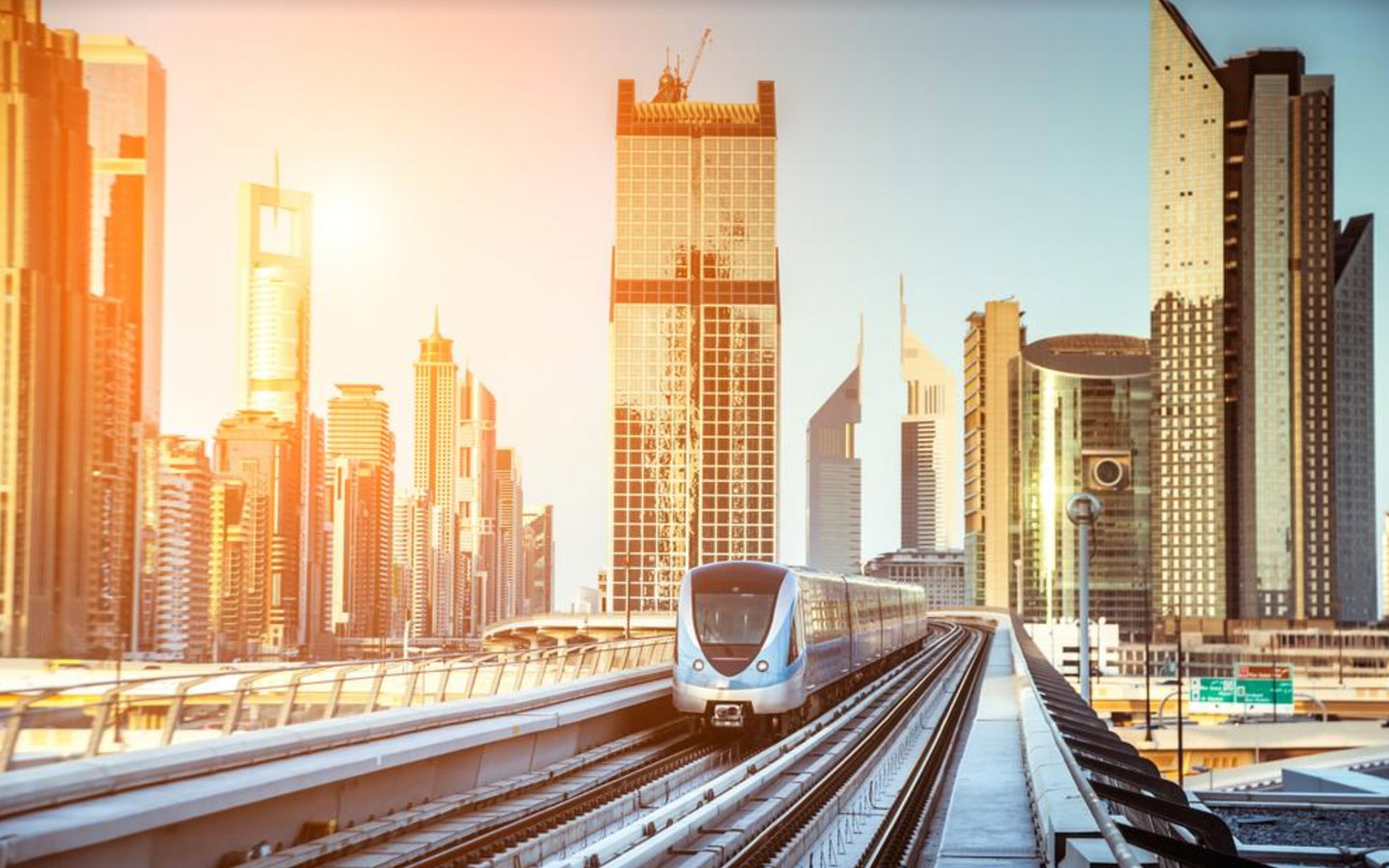
Here are the things you need to know about the Dubai metro
- Fares are charged in correspondence to different zones
- Tourists generally purchase a silver card or a red ticket
- The red ticket is valid for 90 days while the silver card can be used for up to 5 years
- There are different cabins so don’t forget to hop into the right one else you’ll be fined
- Children under the age of 5 or less than 90 cm can travel for free

Keep your Drug prescriptions when visiting Dubai
If there is anything Dubai has a zero-tolerance for, it is the use of drugs. The policy isn’t just strict against recreational drugs but the government has specific rules when it comes to prescription medication as well. If you bring in any medication without being aware of its status as per the guidelines in Dubai, you could easily get in trouble. It is imperative that you double-check all the medications you are planning to take on your visit to Dubai. Have all your prescriptions with you and try not to carry any medicine that the authorities won’t approve of. Remember, you are here to enjoy and nothing is worth the horrors of being behind bars.

Do Check Timings
This is a very important point because you don’t want to head to a tourist spot just to realize that it’s closing time there. Dubai also doesn’t have the same days of the weekend as most of the world. The equivalent of a weekend here is Fridays and Saturdays while everyone has to report back to work on Sundays.

So make sure you have the timings right for all popular tourist spots in Dubai. It’s better to plan or schedule your day ahead of time so that you can experience the best of this city.
Do Keep Calm
Fines are issued if one is found engaged in aggressive arguments and fights in Dubai. This includes verbal abuse as well. Besides, whether it’s Dubai or anywhere else in the world – ranting, shouting and arguing is not appreciated and is considered offensive. The only difference is, here you can probably face jail time for it or even get deported.
Don’ts for Tourists in Dubai

Don’ts in Dubai mean exactly that – don’ts. No exception. We have summarized a few of the important ones that are absolutely essential for you to not get into trouble while you are on vacation in Dubai. Don’t think by any means that this city is extremely conservative. On the contrary, Dubai has the most number of expats and a huge number when it comes to tourists visiting the city, but since it is a Muslim country, one needs to be respectful of Islamic values and culture.
No PDA or Public Display of Affection
PDA makes most people uncomfortable, however, in Dubai, it can result in a fine or even an arrest! That’s right, the only amount of PDA that is tolerated here is holding hands or innocent hugs. Kissing and beyond, in short, anything that implies a report-worthy behaviour with the opposite sex in public is a giant neon sign that says NO.

Don’t Drink in Public
While alcohol is easily available in licensed restaurants and pubs, being inebriated in public, is a criminal offence. As a tourist in Dubai, the last thing you need is to get deported or sent to jail for being intoxicated in public. If you do end up having a few more drinks than anticipated, get into a cab and go home without causing a ruckus. Also bear in mind that you can only buy alcohol in Dubai if you have a license. So tourists will have to rely on the licensed bars and restaurants for their tipple.
Don’t Take Photographs Without Permission
No matter how Insta-worthy that photograph is, it is offensive to photograph locals and certain buildings in Dubai. Most people would consider it rude to have their photos taken without their permission, so it’s best to ask them first. Other than that, you can take as many selfies as you like. Furthermore, avoid taking photographs of airports, police stations, ports, royal palaces, and military buildings.
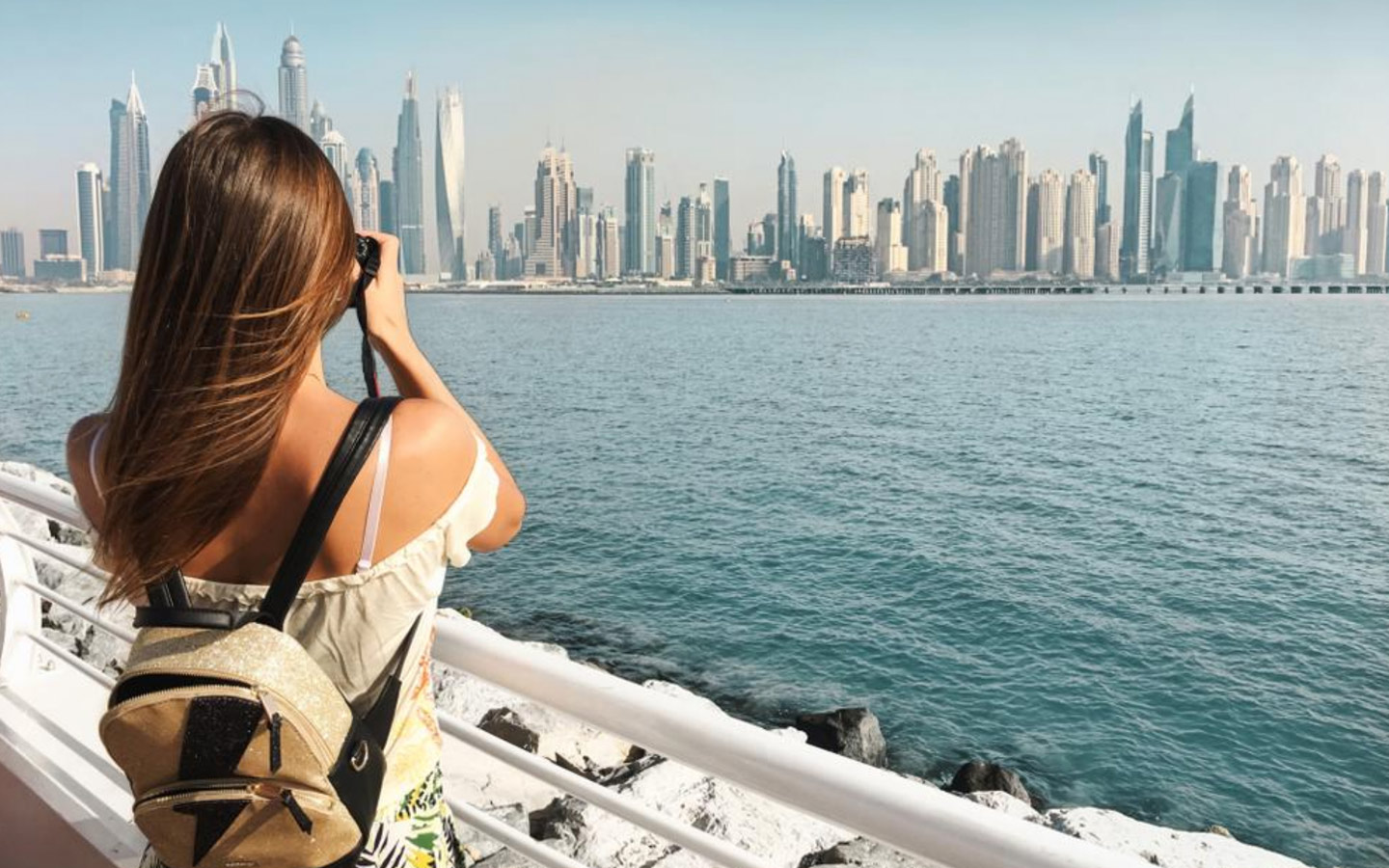
Don’t Drink and Drive
This rule has a tolerance level equivalent to the drug policy in Dubai. Zero. Even a slight trace of alcohol in your system can give you a one-way ticket to prison. Dubai is one of the safest cities in the world and it has taken a considerable amount of effort and regulations in place to achieve that recognition. Apart from no drunk driving, if you speed, there are cameras everywhere and a significant fine gets issued. Racing, and using your phone while driving can also get you fined if caught.
Here are some quick don’ts to make yourself aware of and save yourself unnecessary trouble when visiting Dubai. Last but not least, rules are just for your own safety so apart from abiding, don’t forget to have the time of your life in one of the best cities in the world.
- Don’t make or flash rude hand gestures
- Don’t point fingers at people
- Don’t explicitly eat, drink or smoke during Ramadan
- Don’t use swear words
- Don’t dress immodestly when visiting religious places like mosques
- Don’t smoke in shopping malls, offices, and government areas
- Don’t accept drinks from strangers at clubs
- Don’t litter around because you’ll be charged with a heavy fine
That’s MyBayut’s guide to having the best time in this beautiful city without any trouble! If you’re visiting the city soon, take a look at the top places to visit in Dubai in winter to make the most of the good weather. Or experience a bit of culture by checking out the best of old souks in Dubai ! Stay tuned to MyBayut for more articles about visiting the UAE !
Leave a Reply Cancel Reply
All about the Dubai-Abu Dhabi Virgin Hyperloop One project

Bayut Academy: The most important tip to convert real estate leads to sales

All about the Al Qattara Arts Centre, Al Ain
- Residential Plot
Sliding Sidebar

Dubai Visas, Laws & Customs

A first-timers guide to understanding Dubai
In this section, we cover everything you need to know about how to legally enter Dubai as a tourist, along with religion, dress code, and customs all visitors should be aware of when planning a trip to Dubai.
Tourist Visas for Dubai
Religion in dubai, dresscode in dubai, the do’s and don’t every first-time visitor to dubai should be aware of.
To enter the UAE as a tourist, everyone except GCC nationals needs a Tourist Visa .
For many nationalities, however, the tourist visa is free on arrival for either 30 days or 90 days.
- We share the complete list of countries and how visa extensions work here.
If you are not from one of these countries, then you can apply through your airline or a travel agent for a transit visa (free for 48 hours if arranged in advance, or 50AED for 96 hours), or a 30-day single entry Tourist Visa which costs 350AED.
- For a complete guide to Dubai Tourist Visas, click here.
If you have overstayed your UAE tourist visa or wish to renew a 30-day visa, click over to this article , where we detail how to do a “visa run” from Dubai.
If you have any uncertainty about the process of applying for your Dubai Visa or what category you should be applying for, then it’s always best to seek an immigration consultant in Dubai .
(Note we are not a tour agency registered in the UAE. We cannot help you with this step!)
Dubai is a Muslim country with a Sunni Muslim majority of approximately 76%. The country’s laws are based on a Civil Law System, and Sharia Law, which may have some key differences from the legal systems tourists are used to.
- You can learn more about “the Call to Prayer” and Islamic practices in Dubai here
- See a full guide to Dubai’s Religious and Public Holidays to be aware of here
- You can find a full tourists guide to the Holy Month of Ramadan here
- Learn more about non-Muslims visiting Mosques here
As a Muslim country, there may be a stricter standard of dress expected of you than you normally experience in your home country. Whilst there is no need for non-muslim tourists to be fully covered, tourists are expected to be respectful of the culture and dress in a conservative manner in public places.
The difference between public and private places and what’s considered appropriate can be tricky in some situations, so we have a detailed guide here to help you navigate your way around the Dubai dress code .
You can also check out:
- 10 Best dresses to pack for your trip to Dubai
- Ultimate Dubai packing list for men & women
- What to wear when visiting a Mosque in the UAE
- What to wear on a Dubai desert safari
- What to wear in Dubai Mall and shopping areas in Dubai
Particularly if you’ve never visited a more conservative Muslim country before, there may be a few social rules and strict laws you are unaware of that could land you in trouble with the law. We also have these detailed guides which may help you understand local laws and customs to be aware of:
- You can read our full guide to the do’s and don’t for first-time visitors here .
- Am I allowed to drink alcohol in Dubai?
BACK TO OUR DUBAI ESSENTIAL PLANNING INFORMATION HOMEPAGE
Please note we are not a travel agency. This site is a travel blog to help newcomers to the UAE and transit passengers self plan their trip, we cannot book your flights, hotels, visas or connections for you. We may make a small commission if you click on any of our recommendation links . Dubai Travel Planner
Top tips for female travellers visiting Dubai
Dec 7, 2018 • 7 min read

October 4 2017: Three Surfers go into the waters during sunset with the Burj Al Arab hotel in the background.
Many travellers imagine that visiting Dubai as a woman is much more difficult, complicated and stressful than it actually is. Dubai ranks high on the list of the world’s safest cities, despite its location in a region that often makes headlines for being in seemingly eternal conflict. However, with the city’s reputation as a blinged-up Disneyland crossed with its Islamic-rooted governance, what is and isn’t allowed isn’t always clear.
While female visitors certainly aren’t expected to don burkinis at the beach, brushing up on local customs and norms before your trip will help you avoid awkward or potentially risky situations, and it will let you in on a few female-centric perks too.
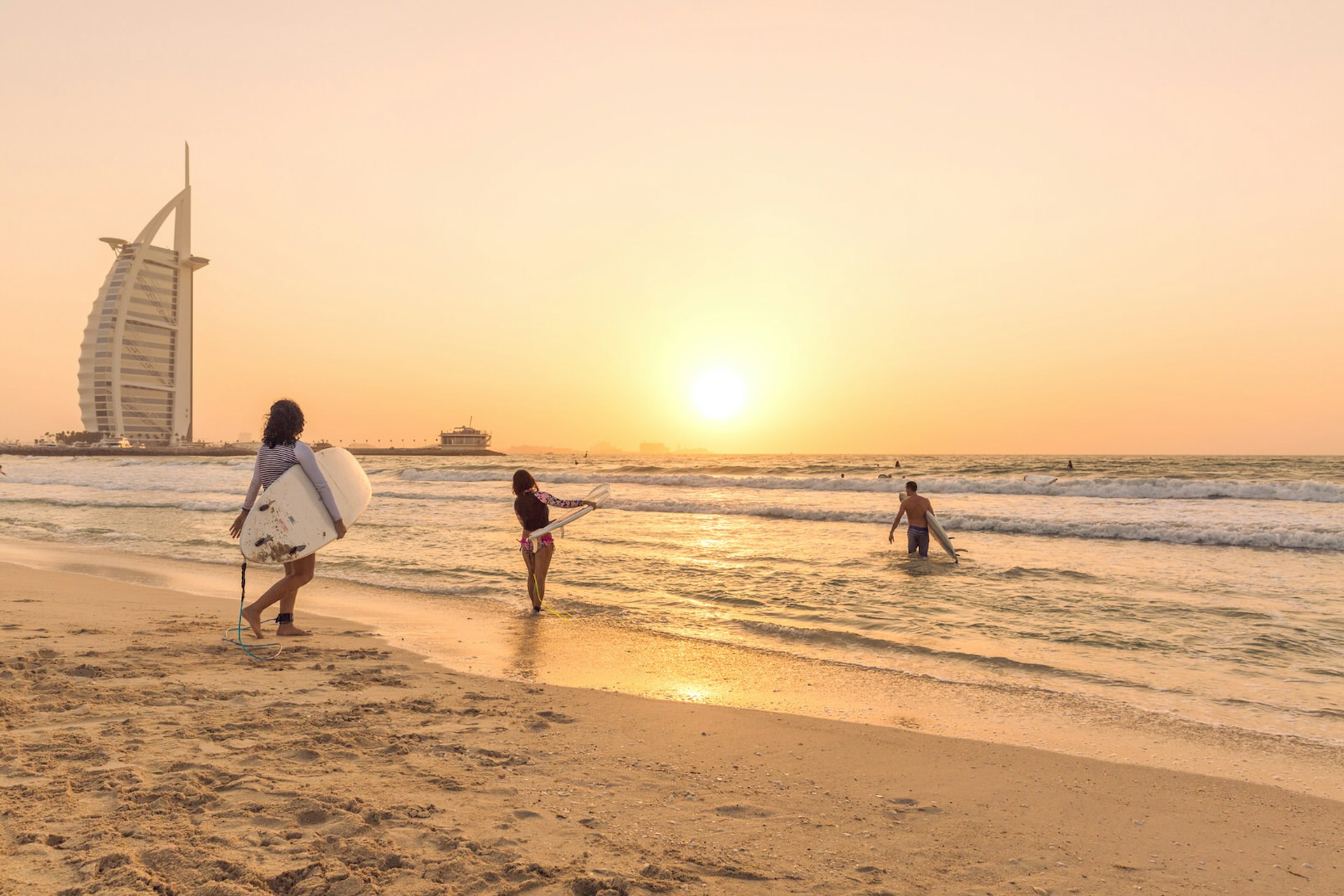
What should I wear in Dubai?
Dubai ’s quest to be the biggest and brightest might appear to indicate otherwise, but this city still has strong traditional roots. Emiratis – both men and women – dress in loose-fitting robes, and you’ll see many local women opting to cover their hair or faces with a scarf. Visitors don’t have to do the same, but covering your thighs and shoulders is recommended, so pack long skirts or baggy trousers. To visit a local mosque, women do need to wear a headscarf, but these are usually provided if you forgot to bring one. A colourful pashmina or scarf draped around the head and hair will do the trick.
Dubai’s bars and clubs are a different matter, and you can wear whatever you would to go out back home. However, be aware that many nightlife spots are located in hotels or shopping centres, so bring a cover-up to avoid awkward situations when moving from bar to bar. For example, if you decide to bare midriff, thighs or shoulders and arms, bring a scarf or another cover-up to don when moving on to your next watering hole.
It’s fine to wear your bikini on the beach or at the pool, but don’t wear it out and about. Not only will you be freezing (thanks to Arctic-like air conditioning in most malls and public spaces), but you’ll also offend locals, though they’ll most likely be too polite to say anything.
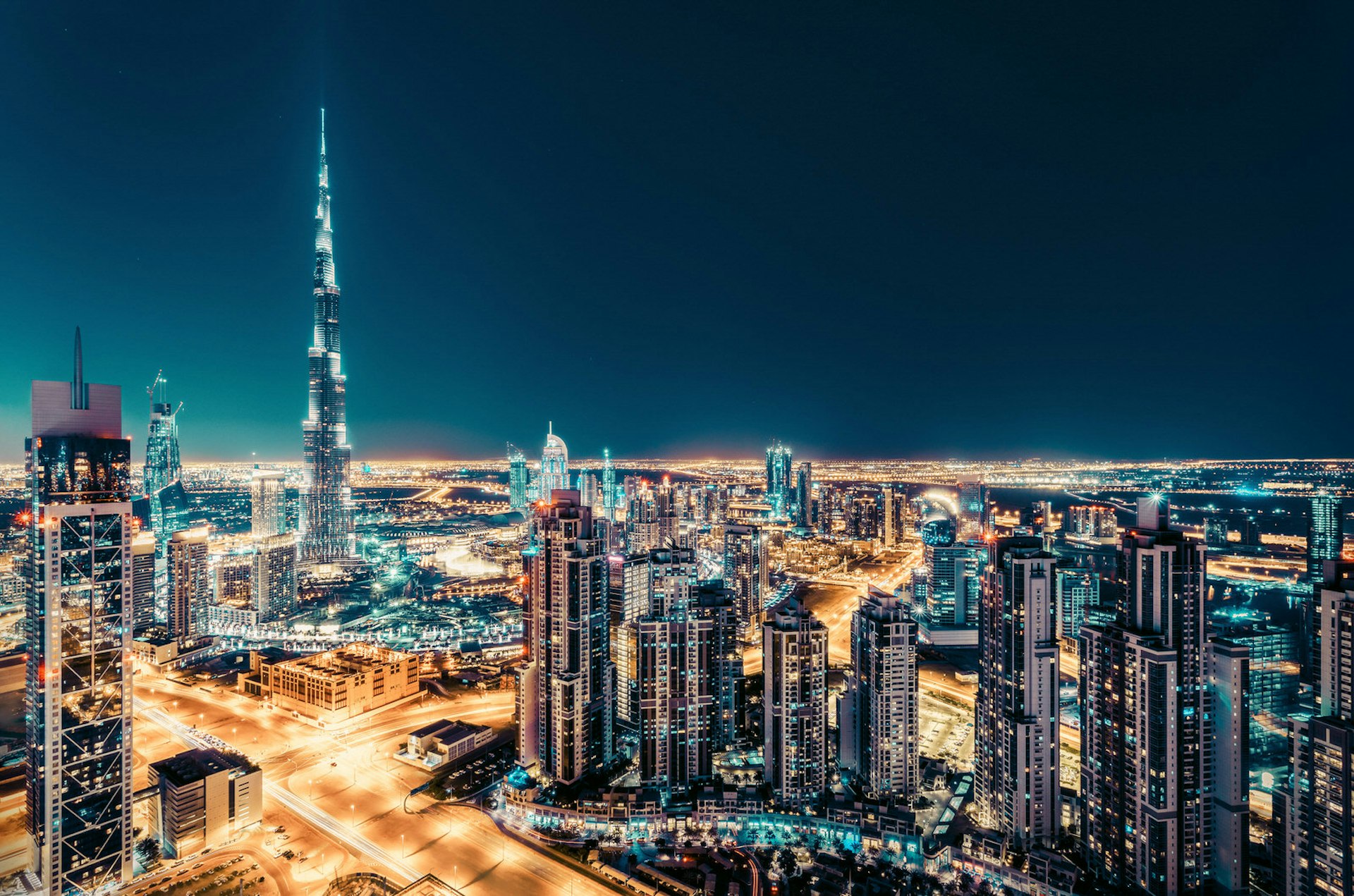
What should I wear if I’m visiting during Ramadan?
During Ramadan, you can still wear a bikini when sunbathing at the hotel pool or beach, but make sure you’re covered up as you walk through the hotel itself. When you’re out in the city, put on a below-the-knee skirt or loose-fitting trousers and a top that covers your upper arms and isn’t low cut.
Will I be harassed?
Women visiting Dubai can feel at ease sightseeing, taking taxis and dining out alone, even late in the evening, and the World Economic Forum ranks the United Arab Emirates as the world’s second safest country. That’s not to say that you won’t get any unexpected attention, but unfortunately, we’ve yet to come across many cities in the world that are entirely wolf-whistle free. If you are approached with a chat-up line, it’s not a problem to completely ignore it or politely but firmly decline it.

Can I drink alcohol in Dubai?
This is a grey area. At the airport, Dubai Duty Free sells oodles of alcohol to anyone over the age of 21, bars and clubs in the city’s hotels offer tempting happy hours, and free-flow boozy Friday brunches are legendary. Despite all of that, drinking alcohol in Dubai is technically illegal unless you have a licence, but there’s no way for temporary visitors to obtain one. Dubai police don’t track down beer-drinking tourists unless they’re causing a disturbance. Recently, there have been more calls for clarification on ‘the law that forgot about tourists’, but so far there’s been no resolution, and the current law is still the baseline.
What are ladies’ nights?
One of the big perks of being a female traveller in Dubai is the endless array of ladies’ nights. Once limited to women getting a free drink or two on a Tuesday evening – a clever marketing ploy in the days when the drinking crowd in Dubai was very male-heavy – ladies’ nights have become a Dubai institution and happen every night of the week at venues around town. From free or reduced access at beach clubs to free cocktails at bars and half-price dinners in some of the city’s best restaurants, tracking down ladies’ nights takes the punch out of what can otherwise be an expensive evening out.
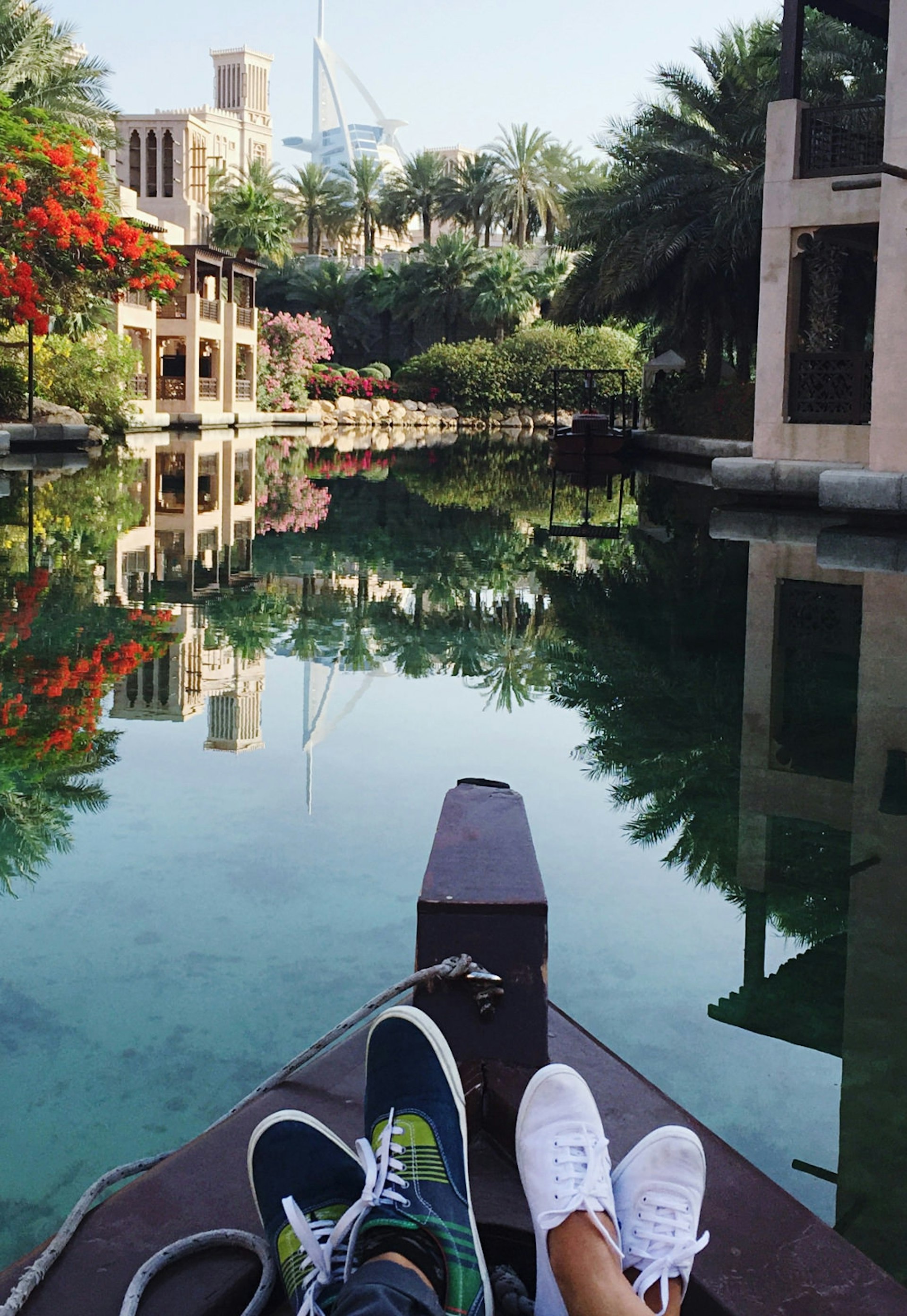
Can I stay in a hotel room with my partner if we aren’t married?
Though thousands of unmarried couples cohabit without any issues in Dubai – presumably sharing beds as well as addresses – sex outside marriage is illegal and is punishable by jail and possibly deportation. This law seems to fall into the ‘if no one is bothered by it, then it’s OK’ category. However, should a complaint be made about you cohabiting with a member of the opposite sex – whether you book into a hotel room with your travel partner or want to bring someone home from a nightclub – then you could be in trouble. Hotels request passport details from guests checking in, but this is for security reasons rather than an attempt to find people having premarital sex.
When it comes to contraception, you’ll find condoms for sale in supermarkets, pharmacies and petrol stations, but the morning-after pill is illegal. Doctors in the UAE are required by law to report pregnancies in unmarried women. If you think you might be pregnant, consider waiting until you’re back home to consult a professional.
Who should I contact in an emergency?
The Dubai Police are extremely responsive and can help you with a whole manner of things from theft to road accidents. Dial 999 for emergencies and 911 for non-emergency situations. However, in cases that involve sex or alcohol, it’s better to contact your embassy, which might be able to advise further. If you are raped, reconsider reporting it to the authorities. While action against the perpetrators would be taken, you could find yourself charged with sex outside of marriage and face prosecution yourself. Instead, get in touch with your embassy, which can help you without involving local authorities.

How can I meet locals in Dubai?
What better way to find out more about life in a city that’s grown from a tiny fishing village to a mega-metropolis in less than half a century than by speaking to the locals? The Sheikh Mohammed Centre for Cultural Understanding hosts weekly sessions where you can find out more about local culture and traditions with Emiratis of both sexes, including a no-holds-barred Q&A session where you can ask anything you’d like. Meet the Locals offers meetups where you can have lunch with people from all over the Emirates. Another option is ExpatWoman , a long-running group that has local members, a hugely informative database and an interactive forum. Tinder exists, and it’s incredibly popular. Various other dating apps are available for download too.
What do LGBT+ travellers need to know before visiting Dubai?
LGBT+ rights in Dubai are heavily suppressed. Public displays of affection, while frowned upon for straight couples, are a strict no-no for gay couples. You’ll see some local men holding hands, as well as nose rubbing between the sexes, but this is all platonic. Cross-dressing in public is illegal, and transgender travellers could face issues when filing official documentation. Gay travellers sharing a hotel room are unlikely to face any issues, unless you’re staying in some of the smaller locally run hotels in the older parts of the city. Instead, book into a higher-end, international-branded hotel. There’s no gay scene in Dubai per se, but The Play Room at The Oberoi, Barberry at Tryp by Wyndham and Zinc at the Crowne Plaza might be worth a visit.
Make the most of your travel with sightseeing tours and activities from our trusted partners.
Explore related stories
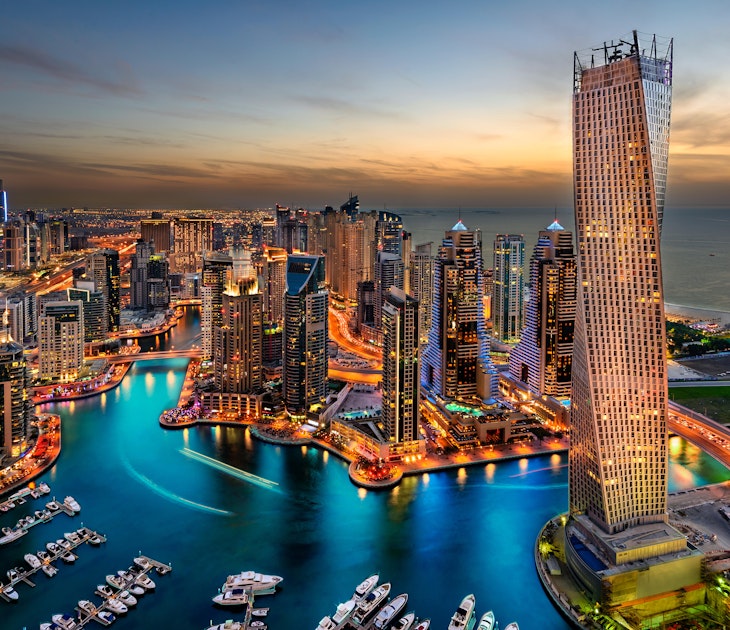
Aug 16, 2019 • 7 min read
Dubai is home to the world's tallest building, colossal malls and vast empty deserts. Don't go without these top tips.

Aug 17, 2018 • 4 min read

Apr 17, 2018 • 4 min read

Dec 2, 2010 • 3 min read

Apr 14, 2024 • 6 min read

Mar 26, 2024 • 8 min read

Mar 8, 2024 • 9 min read

Mar 4, 2024 • 4 min read

Feb 13, 2024 • 5 min read

Dec 7, 2023 • 5 min read
Cookies on GOV.UK
We use some essential cookies to make this website work.
We’d like to set additional cookies to understand how you use GOV.UK, remember your settings and improve government services.
We also use cookies set by other sites to help us deliver content from their services.
You have accepted additional cookies. You can change your cookie settings at any time.
You have rejected additional cookies. You can change your cookie settings at any time.
- Passports, travel and living abroad
- Travel abroad
- Foreign travel advice
United Arab Emirates
Warnings and insurance.
The Foreign, Commonwealth & Development Office (FCDO) provides advice about risks of travel to help British nationals make informed decisions. Find out more about FCDO travel advice .
Before you travel
No travel can be guaranteed safe. Read all the advice in this guide as well as support for British nationals abroad which includes:
- advice on preparing for travel abroad and reducing risks
- information for women, LGBT+ and disabled travellers
Follow and contact FCDO travel on Twitter , Facebook and Instagram . You can also sign up to get email notifications when this advice is updated.
Travel insurance
If you choose to travel, research your destinations and get appropriate travel insurance . Insurance should cover your itinerary, planned activities and expenses in an emergency.
Related content
Is this page useful.
- Yes this page is useful
- No this page is not useful
Help us improve GOV.UK
Don’t include personal or financial information like your National Insurance number or credit card details.
To help us improve GOV.UK, we’d like to know more about your visit today. We’ll send you a link to a feedback form. It will take only 2 minutes to fill in. Don’t worry we won’t send you spam or share your email address with anyone.
- Login / Register
20 Super strict Dubai Rules Every Visitor Must Be Aware Of!
Amongst the world’s media, especially in countries such as the UK, there has been a lot reported on how people are to act in Dubai which has resulted in a lot of confusion. It is important to remember that there are many different cultures living in Dubai with different definitions of what is and what is not acceptable and the Dubai government is trying to maintain harmony among all these communities.
Dubai Rules concerning Alcohol & Licensing
We set out your rights when it comes to alcohol and licensing. It is important to note that the penalties for breaching any of the following licensing laws are a jail term and can be combined with deportation in some cases.
1) If you are a Muslim expatriate, drinking alcohol is strictly forbidden in any circumstance.
2) If you are non-Muslim, you may only consume alcohol if you personally hold an alcohol license. You should keep this license with you at all times. The license is granted by the police licensing authorities in the Emirate in which you live. The alcohol license will allow you to purchase alcohol up to a percentage of your monthly salary.
3) Even if you hold an alcohol license, you should only drink alcohol in your own home or a licensed restaurant or bar. It is against the law to consume alcohol or have alcohol in your system if you are not in your own home or in a licensed venue. Whilst this law is usually only enforced in conjunction with another crime, expatriates should still be careful, considerate, and courteous whilst traveling from venue to venue on an evening out.
4) Alcohol should only be purchased in the Emirate in which the expatriate holds an alcohol license. It is therefore against the law for an expatriate residing in Dubai to purchase alcohol from liquor suppliers in Ras al Khaimah.
5) There are zero tolerance laws for expatriates drink driving in the UAE. This means that you may have NO alcohol in your system whilst driving. Alcohol can take up to 48 hours to leave your system. Take this in to account when driving the day after a night out.
Dubai Rules concerning Traffic Offenses
When it comes to traffic offenses,it is important to note that the penalties for breaching any of the following traffic laws can include black points, fines, and/or imprisonment in some cases.
6) It is a criminal offense to leave the scene of an accident, however minor. The criminal sanctions for leaving the scene of an accident in which a person was injured are more severe (imprisonment and/or a minimum fine of AED 25,000).
7) It is a criminal offense to drive a car with any alcohol in your system, regardless of whether the alcohol was consumed legally or not. According to UAE law, there is zero-tolerance to drink while driving.
8) It is a criminal offense to drive without a valid driver’s liability insurance. Take note of when your car insurance expires so that you can renew it in good time.
9) Keep your car insurance papers, car registration documents, and driving license at hand when driving. In the event of an accident, it is a criminal offense if you fail to provide these to the police (although you may be given time to do so following an accident).
10) It is against the law to drive a vehicle in Dubai which is not in good mechanical condition, or does not have safe and functioning steering, brakes, horn, front mirror, wipers, seat belt, and spare tire in a usable condition or headlights. If in breach of these laws, the vehicle may be confiscated by police and/or the driver fined or imprisoned. Please consult the RTA website for full details.
Dubai Rules concerning Drugs
Penalties for breaching any of the following drug laws can include imprisonment and deportation.
11) The consumption of illegal drugs in the UAE is a criminal offense, punishable by possible imprisonment and/or deportation. Drugs that are legal in your home country may not necessarily be legal in the UAE, this could include drugs that you have been prescribed for medical reasons in your home country. Consult the following list of restricted and controlled substances before consuming any drugs within the UAE.
12) The import of illegal drugs into the UAE is a criminal offense. Regarding medications, travelers are advised to read the following guidelines before purchasing medication from your home country and bringing it into the UAE. This includes whilst transiting through Dubai airport. If you have obtained a prescription for medication from your home country, it is recommended to carry a translated and attested copy of the prescription with you.
13) Take particular care when returning from holiday if you may have come in to contact with anyone who has taken an illegal drug and may have passed even the smallest quantity on to you. Possession of illegal drugs, even for example a speck on a shoe, maybe a criminal offense.
14) Some medications are illegal in the UAE if possessed without a prescription from a Doctor. These include some sleeping pills, antidepressants, and pain killers. Check with your doctor whether a prescription is required before taking these types of medicines.
15) We have come across a number of cases in which expatriate women’s drinks have been spiked with illegal substances against their knowledge. Such action could result in the woman having committed a criminal offense (by having an illegal substance in her system). Never accept a drink from someone you do not know, and be vigilant in busy bars and nightclubs.
Dubai Rules concerning Public Decency
16) Most malls in Dubai display signs asking shoppers to dress respectfully. So what does this actually mean? In UAE law it does not specify certain acceptable clothing, but in general specifies that clothes should not be sexually provocative, for example, do not wear a bikini in public places.
17) Wearing very short shorts and see-through blouses in public places is also frowned upon, reserve these items of clothing for the pool or private beach club. Wearing a skirt of an appropriate length and t-shirt to the mall is absolutely fine.
18) Another common question is what are the Dubai rules regarding public displays of affection – a married couple are allowed to walk along with hand in hand but are not allowed to indulge in sexual behavior such as kissing, these acts can lead to a jail term followed by deportation.
19) Unmarried couples are not allowed to hold hands in public places. It is also worth noting that unmarried couples are not allowed to live under the same roof and if found to be doing so could be given a jail term of up to one year. Homosexual acts are also illegal in the UAE.
20) Swearing or rude gestures , for example giving someone the finger) should also be avoided – remember this whilst driving and feeling stressed! Any breach of these guidelines could result in imprisonment or a fine.
If unsure about any of the laws in Dubai always try and ask, find out the official answer or err on the side of caution.
Additional Tags : Dubai laws, Dubai population ,what to wear in Dubai ,Dubai facts ,Dubai rules for tourists ,Dubai laws for tourists ,uae sharia law ,Dubai laws for unmarried couples.
Need Online Legal Help in the UAE?Connect with an expert UAE lawyer
Workplace Bullying in UAE is rising. Here,s what you can do.
Workplace bullying and sexual harassment are developing areas of law in the Middle East region. The laws across the GCC
Wirestork Partners With Debitura To Streamline Debt collections
Debt collection is a crucial aspect of any business that extends credit to its customers. Without effective debt collection strategies,
What’s the Hype about UAE’s Virtual assets Regulatory Authority?
The UAE’s Virtual Assets Regulatory Authority (VARA) is a newly-established organization that will regulate and oversee the development of the
What to do when someone defames you on social media in UAE?
Defamation on social media is a serious crime as per UAE law. What are your options when someone defames you
What happens if your husband dies without a will in the UAE?
The law of Inheritance in the UAE Although Article 17/1 of the Civil Code of the UAE provides that it
What happens if a Cheque bounces in UAE?
Do you have a cheque bounce case in the UAE? Here,s what you need to know. When Dubai’s property market
- Police Case
- Saudi/Bahrain
- image/svg+xml 0 Cart
Shopping cart
No Service Requested.

General Dubai Rules for Tourists -Woman & Unmarried Couple

Originally posted 2019-03-22 15:14:30.
In terms of both its fame and prosperity, Dubai ranks as one of the world’s most famous and prosperous cities. It is considered one of the most prosperous Emirates in the world. Having developed in many ways and due to its many reasons like tourism, law enforcement, jobs and other opportunities that it has to offer, Dubai attracts a lot of people towards itself and most people like to visit Dubai at least once in their lifetime and some even visit it multiple times. As a result of Dubai’s modernization, it has developed into one of the world’s most exciting hotspots, and despite being underdeveloped a few decades after its glory. It has one of the world’s most exciting hotels, deserts, beaches, tourism, and one of the world’s tallest buildings the Burj Khalifa , as well as the man-made island of Palm. But regarding these delights, it has very strong law policies and people can’t break them. If they break intentionally or unintentionally, they face strict action against them and suffer fine and maybe send to jail. Keeping yourself safe in Dubai requires that you follow all the requirements, it is preferable to study the rules in order not to be troubled. Dubai has very fascinating desert adventures to enjoy and Dubai is very hospitable and welcomes everyone to its country.
Considering the country is ruled by Islam and Dubai is a part of it, many rules must be followed regarding marriages, couples, tourists, men, and women. In this article, we will be discussing the following rules:
- Rules for tourist
Rules for Women
Rules for unmarried couple.
Table of Contents
General Rules for Tourist
It has no objection that Dubai is one of the best places around the world to visit. Following are the rules for tourist:
- Clothing: Since Dubai is an Islamic state, people are advised to wear reasonable and decent clothes while in public areas and short clothing should be avoided since it reveals sensitive body parts and should not be worn in public areas. It is important that both men and women follow the values of the place and treat each other with respect. In spite of this, it is not mandatory for women to wear the veil. When laws are violated, legal action is taken against those who violate them. As a means of maintaining air passage, loose clothing can help you to stay cool in deserted countries.
- Drugs, Alcohol, and Weapons: There is a strict prohibition on the sale of any type of drugs, as well as any attempt at smuggling drugs, that can be harmful to the body, and that is prohibited and not permitted in Dubai. Throughout Dubai and the rest of the world, airports use sophisticated technology to scan all people and luggage. If you commit a crime related to narcotics, you may be deported, fined, or even imprisoned for up to a year, depending on the severity of the crime committed. As for carrying weapons in public, this is not allowed under any circumstances due to the possibility that weapons might cause danger to people, as well as the infringement of human rights. Alcohol consumption in public and driving are prohibited, and you can only purchase alcohol and cigarettes from stores with the permit, so tourists cannot purchase any alcohol.
- Photography: As far as capturing beautiful memories goes, there is no better option than to capture those memories in a photograph so that they become a part of your entire life from that point forward. While you are allowed to take a picture of yourself and your friend accompanying you, it is strictly against the law to take pictures of women and persons you don’t know, and you will likely be charged if you are caught.
Suggested Content: Read my Desert Safari Dubai Review here .
Music: Listening to music in public is not allowed if it is too loud. Almost everyone enjoys listening to music, but loud music must be kept in mind. When listening to music, you should wear headphones or go to a special place where loud music is permitted.
Ramadhan Respect: During Ramadhan the whole month, Muslims avoid eating in public and drinking water from sunrise to sunset.
Weekend: As you are familiar that weekend starts on Saturday and Sunday but in Dubai weekend starts on Thursday and ends on Friday. Sunday is a working day. NOW, In UAE weekend are Saturday and Sunday .
Language: Bad language, abusive words, vulgar language is not allowed even to say, ‘swear by God is not allowed’ and you face legal action from police.
Work Policy: During the visit visa, it is illegal to do any type of work because if you want to work then you should have a working visa called “Iqama” . You will be fined and face strict action against this act.
- Dancing: Dancing is considered bad in public but allowed in places like clubs, private places, or designated places.
- Respect: In Arab countries, women have special respect because she is a mother, wife, sister, daughter and most importantly she is a woman. According to Islam, women should treat nicely and decent manner.
- Veil: It is not mandatory for women to wear a veil. It is up to choose what a woman wants to wear or not.
- Driving: Women can drive a car, but a license card is mandatory for driving it ensures the safety of people and a healthy city.
- Dressing: Women aren’t allowed to wear very short clothes in public that are indecent, but these restrictions are relaxed at designated places like swimming, etc. Women should wear clothes that are below knees and shoulder covered.
- Harassment Policy: Dubai has a strict law against women harassment and provides safety to women and whoever violates the law will face strict action.
- Working women: Despite having the responsibilities of household work Dubai also gives women the right to work and she freely work there according to the rules. Modernization gives women more rights.
Due to the restrictions imposed by their religion, Arab countries have strict rules for unmarried couples, which are unlike rules in other countries. In many non-Islamic countries, it is not considered a bad thing for a couple to leave without getting married. However, in Muslim countries, it is considered illegal by law and by Divine authority. So, they develop laws to handle this type of criminal activity.
- Living in one room: Dubai doesn’t allow couples of opposite genders to live without marriage in one room because it is considered illegal. If married, then no restrictions will apply regarding this. Please note (As you might already know, the UAE cabinet passed a bill in November 2020, which allows unmarried couples to stay together in the same room).).
- Relation: Unmarried couple isn’t allowed to develop any kind of deep relationship with the opposite gender and you absolutely face strict action for this act.
- Public behaviour: Couples aren’t allowed to do any type of adult or private act in public even if married and face strict action in order to spread inappropriateness in society. It is against Social Ethics.
Note: It is important to note that this article is not intended to be legal advice. My views are a result of my own experience and general information that I have found on the internet.
Updated: 4th Sept 2023
Similar Posts

Palm Fountain: Launching of the Biggest Fountain
Palm Jumeirah is known to be situated in Dubai, UAE (United Arab Emirates). It is an offshore Island that is manmade. It is especially for private hotels and houses. The most fascinating is that the name “Pal Jumeirah” has been kept on the way it looks. If seen from high up in the air you…
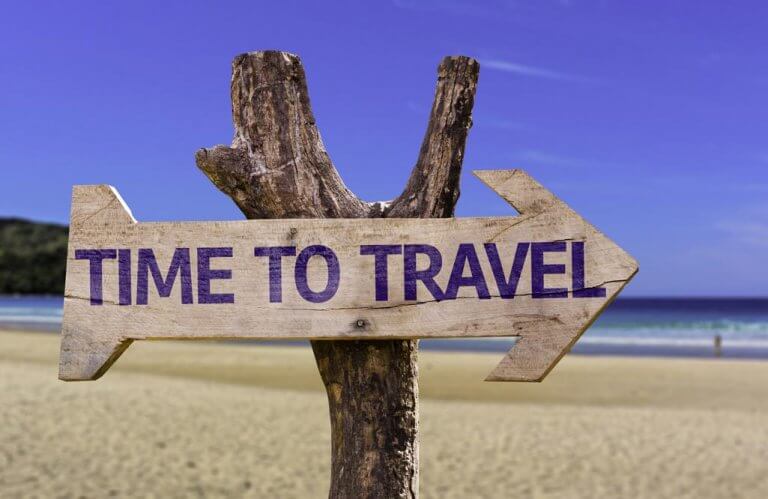
12 Nearby Cheap Countries to Visit from Dubai with Easy Visa Requirments
Originally posted 2022-03-09 15:45:31. Updated: 7 July, 2023 Over the past two years, several countries have slowly begun to open their borders to international travelers, including those who are traveling from the United Arab Emirates, after being kept in their homes for more than two years. Since a number of countries have reduced their restrictions…

What is the Best Time to Visit Burj Khalifa?
Originally posted 2022-02-24 16:35:00. Standing at the feet of Burj Khalifa, my eyes gasped at the very first sight of the soaring monstrous skyscraper! At an unattainable height of 829 meters, Burj Khalifa is truly the indomitable edifice of humanity, which dared to touch the clouds and rise higher! No wonder it took them 5…

Best Time To Visit Dubai by Months
Originally posted 2020-12-12 03:17:00. Dubai is a city that draws people from all over the world who love life and are driven by desire. It is a city filled with people who love life and are driven by desire. The city of Dubai is not just known for its modern towers, but also for its…

55 Top Things & Places to Visit in Dubai 2023 : Discover Dubai’s Best
Originally posted 2022-10-17 08:01:33. Whether it is the world’s tallest skyscraper, a shopping mall, a theme park, or the world’s second biggest gold market, Dubai has a variety of attractions designed to surprise you with their size. Having emerged on the world map only 50 years ago, Dubai has made quite an impact on the…
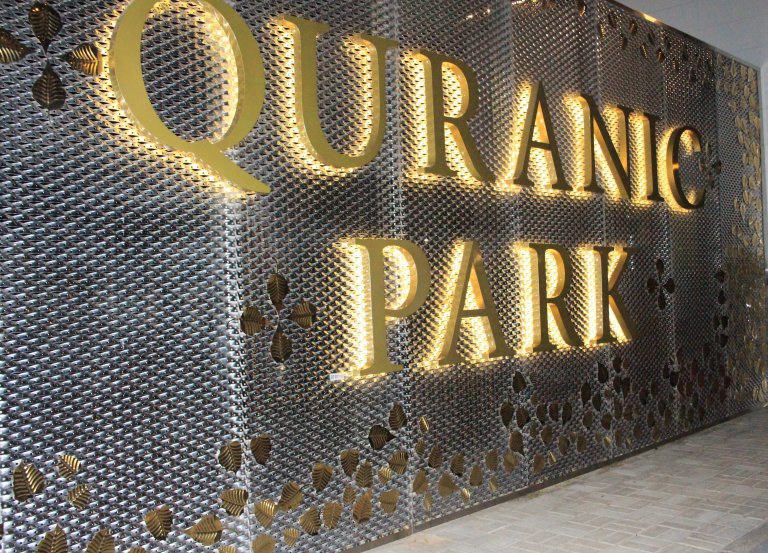
Al Quran Park : Featuring Miracles of Islam
Originally posted 2019-04-01 17:51:07. Al Quran Park is the most prestigious and holy place to visit in Dubai. It was inaugurated on March 29. A unique feature of Al Quran Park is that it contains all the miracles of Islamic values accounted for in the Quran, the Holy book of Muslims. Entry to this park…
Leave a Reply Cancel reply
Your email address will not be published. Required fields are marked *
This site uses Akismet to reduce spam. Learn how your comment data is processed .
Important: Alternate ways to get help if you experience long call wait times
- Travel requirements for Dubai
Travel advice for Dubai residents
Find out the process for returning to Dubai, whether you’re already overseas or you plan to fly from Dubai and return.
Tourists travelling to, from, and through Dubai
Follow the process to make sure you have everything you need before you travel to, from, or connect through Dubai.
- COVID-19 information hub

European Union adopts more favourable Schengen visa rules for Indians
Indian Nationals can now apply for a multiple entry Schengen visa with longer validity
On 18 April 2024, the European Commission adopted specific rules on the issuing of multiple entry visas to Indian nationals, which are more favourable than the standard rules of the Visa Code that applied to date. This new visa ‘cascade’ regime for Indian nationals residing in India who apply for Schengen (short-stay) visas in India will provide easier access to visas with multi-year validity for travellers with an established travel history, if the passport validity allows.
According to the newly adopted visa “cascade” regime for India, Indian nationals can now be issued long-term, multi-entry Schengen visas valid for two years after having obtained and lawfully used two visas within the previous three years. The two-year visa will normally be followed by a five-year visa, if the passport has sufficient validity remaining. During the validity period of these visas, holders enjoy travel rights equivalent to visa-free nationals.
This decision comes in the context of strengthened relations under the EU-India Common Agenda on Migration and Mobility, which seeks comprehensive cooperation on migration policy between the EU and India, with facilitation of people-to-people contacts being of key aspect due to the importance of India as a partner for the EU.
Schengen visas allow the holder to travel freely in the Schengen area for short stays of a maximum of 90 days in any 180-day period. The visas are not purpose-bound, but they do not grant the right to work. The Schengen area consists of 29 European countries (of which 25 are EU states): Belgium, Bulgaria, Croatia, Czech Republic, Denmark, Germany, Estonia, Greece, Spain, France, Italy, Latvia, Lithuania, Luxembourg, Hungary, Malta, Netherlands, Austria, Poland, Portugal, Romania, Slovenia, Slovakia, Finland and Sweden, along with Iceland, Liechtenstein, Norway and Switzerland.

COMMENTS
A Brief of Do's and Don'ts in Dubai or Dubai Laws for Tourists & Expats. Dress code — Dubai Clothing Laws. Dubai Alcohol Laws — Liquor in public is a social rules violation in Dubai. Dubai driving rules for visitors. Banned food plus others in Dubai — Can one bring pork into Dubai, for e.g. Dubai drug laws and punishments.
When visiting Dubai as a tourist in 2023, it is important to be aware of the photography laws and privacy regulations in order to avoid any legal issues. The city takes privacy and security seriously, and as such, there are certain rules in place regarding taking pictures and filming in public places.
Dubai Travel: Rules and Regulations for Expats and Tourists. We have produced a report that compiles the information you need to know and understand if you're going to have a safe and enjoyable time living or on vacation in the UAE - from dress code to alcohol consumption and drug abuse to holding hands in public.
Travelling to Dubai. All passengers travelling to Dubai are no longer required to present a COVID‑19 vaccination certificate or perform PCR tests. Passengers travelling from or through Dubai are only required to comply with the transit requirements and travel requirements their final destination. Check if you need a visa .
Quick tipsFollow these essentials. Arriving in Dubai. Currency. The weather. Wi-Fi in Dubai. Embassies & consulates. Emergency numbers. Most nationalities can simply get a visa on arrival at the airport but visitors should check their visa requirements before arriving. Both Dubai International Airport (DXB) and Dubai World Central (DWC) have a ...
A passport or travel document, valid for no less than 6 months. Valid health insurance. A national identity card in the case of certain nationalities. A travel ticket showing an onward journey, and in the case of transit visas, this should be within 96 hours of arriving in Dubai. For GCC residents, a copy of your residence permit.
Life in Dubai is back to normal as Covid-19 rules have been relaxed in most places, offering tourists plenty of options to keep busy and entertained. But travelling in the time of Covid-19 is not as simple as it once was and safety precautions must be followed at all times in public places.
Beach freedom: Sunbathers lying on loungers are exempt from wearing masks, as are people eating in restaurants. Palm perk: Arguably Dubai's most iconic hospitality address, Atlantis, The Palm is ...
Explore some frequently asked questions about visiting Dubai from weather to rules and guidelines. Get all your questions answered on Visit Dubai.
Know the contact information for your country's embassy or consulate in Dubai. They can assist in case of emergencies or if you lose your passport. Dubai also has a tourist helpline that you can contact for general inquiries and assistance. The Dubai Tourism Contact Center can be reached at +971 600 555559.
The multiple entry 5-year tourist visa enables tourists to enter the UAE multiple times on self-sponsorship and remain in the country for 90 days on each visit, and can be extended for further 90 days. This type of tourist visa can be issued for all nationalities. To obtain this visa, the applicant must have: proof of stay (hotel/residential ...
One of the things to remember while visiting Dubai is that the UAE's most thrilling city has certain cultural and religious values and rules. While this will definitely not diminish your plans of having one of the best vacations of your life, you must make note of these dos and don'ts as a tourist in Dubai.
Use your mobile phone while driving - this is illegal, and you can get fined. Don't be surprised if you see people going at higher speeds than the signed speed limit. There is a 20km buffer on most major roads in Dubai, before a speeding ticket is issued. Make rude hand gestures, as this can land you in real trouble.
Travel requirements for Dubai. Check the latest COVID-19 travel and testing requirements for Dubai, including advice for Dubai residents, tourists and transiting passengers. Find out the process for returning to Dubai, whether you're already overseas or you plan to fly from Dubai and return.
A visitor guide to the important tourist visa rules, laws, religion and customs they should be aware of when planning their first trip to Dubai, UAE. Latest news. ... Understanding Ramadan Rules in Dubai as a Tourist [11 March to 9 April 2024] Ramadan Cannon in Dubai - Where to See it in 2024. Ramadan Markets in Dubai; Events & Nightlife ...
Dubai Dos Dubai Don'ts Dubai Visit Dubai! As the single most popular travel destination in the Middle East , you might think that a trip to Dubai is akin to visiting Spain, Mexico or Thailand. In many ways, that is the case - you will be surrounded by friendly people, delicious food and brilliant sunshine but there is a key difference that ...
Passport validity requirements. To enter the UAE, your passport must have an 'expiry date' at least 6 months after the date you arrive in the UAE. If you have a residence permit, your passport ...
Visitors don't have to do the same, but covering your thighs and shoulders is recommended, so pack long skirts or baggy trousers. To visit a local mosque, women do need to wear a headscarf, but these are usually provided if you forgot to bring one. A colourful pashmina or scarf draped around the head and hair will do the trick.
Travel disruption April 2024. Airports in the UAE, including Dubai, are facing severe disruption following extreme weather. Check with your airline before travelling. Contact FCDO if you are in ...
Travelling to Dubai. All passengers travelling to Dubai are no longer required to present a COVID‑19 vaccination certificate or perform PCR tests. Passengers travelling from or through Dubai are only required to comply with the transit requirements and travel requirements their final destination. Check if you need a visa .
Dubai rules concerning inappropriate gesture. 20) Swearing or rude gestures, for example giving someone the finger) should also be avoided - remember this whilst driving and feeling stressed!Any breach of these guidelines could result in imprisonment or a fine. If unsure about any of the laws in Dubai always try and ask, find out the official answer or err on the side of caution.
It has no objection that Dubai is one of the best places around the world to visit. Following are the rules for tourist: Clothing: Since Dubai is an Islamic state, people are advised to wear reasonable and decent clothes while in public areas and short clothing should be avoided since it reveals sensitive body parts and should not be worn in ...
Cancelled inbound flights to Dubai included journeys from Australia, India and South Africa. Usually, around 250,000 passengers travel through the airport on a daily basis but tracking service ...
Travel requirements for Dubai. Check the latest COVID-19 travel and testing requirements for Dubai, including advice for Dubai residents, tourists and connecting passengers. Find out the process for returning to Dubai, whether you're already overseas or you plan to fly from Dubai and return.
On 18 April 2024, the European Commission adopted specific rules on the issuing of multiple entry visas to Indian nationals, which are more favourable than the standard rules of the Visa Code that applied to date. ... Schengen visas allow the holder to travel freely in the Schengen area for short stays of a maximum of 90 days in any 180-day ...